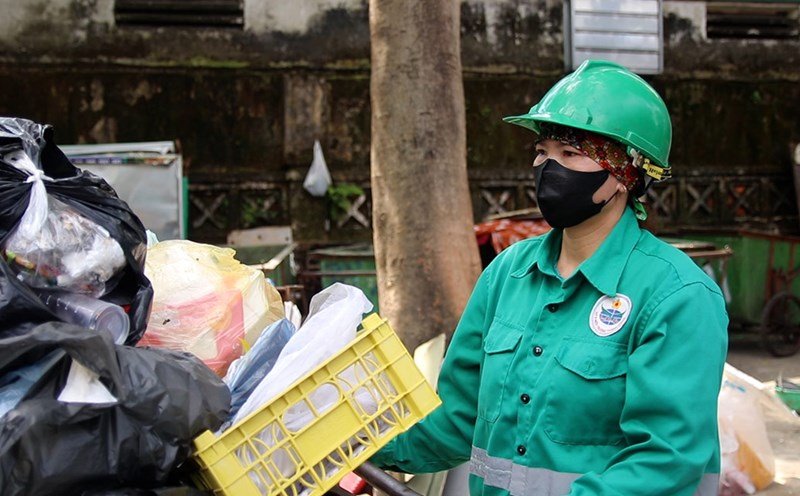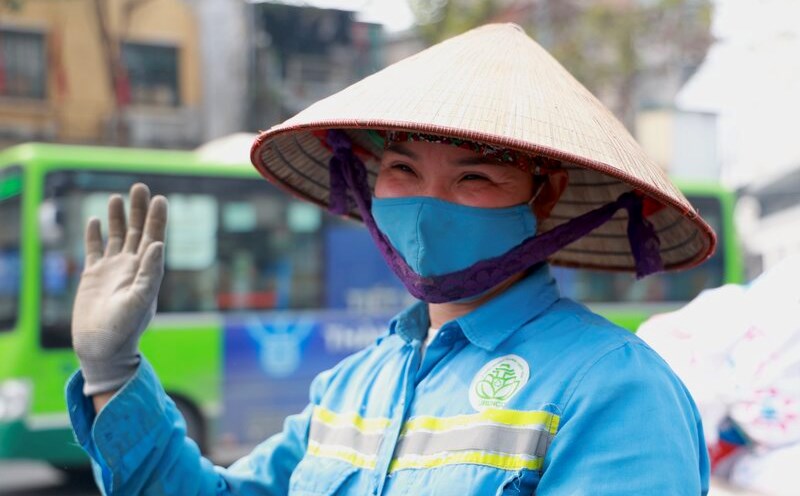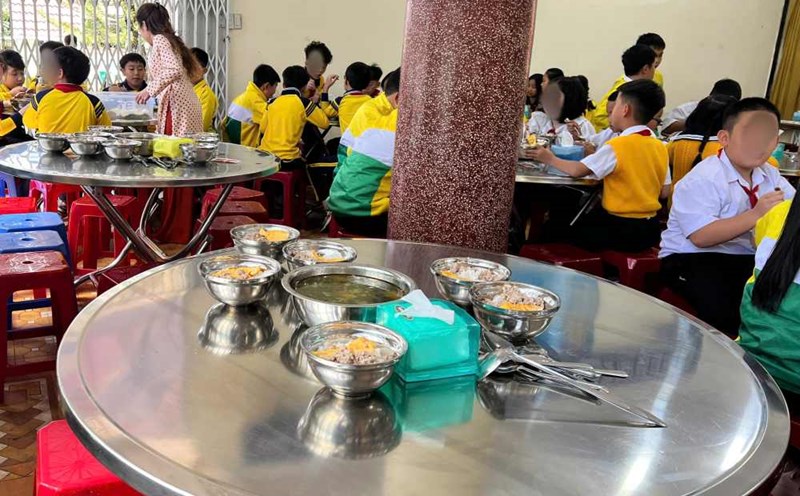17:15: Mr. Nguyen Anh Tho - Director of the Institute of Occupational Safety and Hygiene Science, Vietnam General Confederation of Labor concluded the forum: In reality, the environmental pollution is still serious, especially air pollution from urban areas. Environmental pollution in residential areas is increasingly serious, directly affecting public health and the quality of life. Directive 20 of the Prime Minister was issued to demonstrate the determination of the Government and the Prime Minister and to have specific orientations for tasks and solutions for work and people.
The Trade Union organization as a bridge has had many specific activities to create many large movements among workers. Build a clean and green workplace with safe labor hygiene.
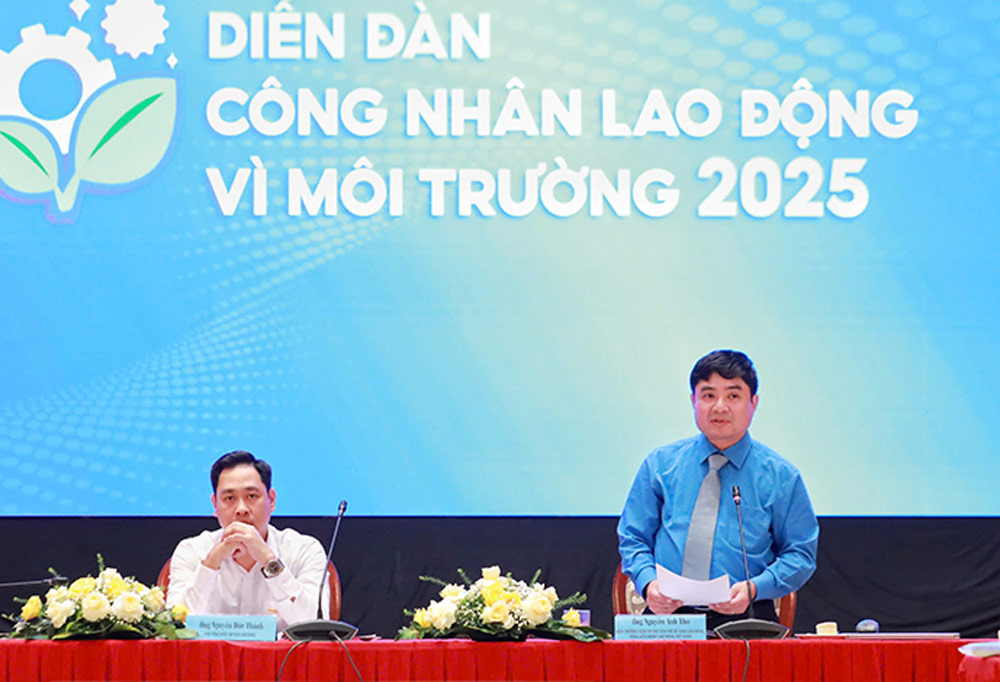
17:00: Ms. Nguyen Thi Dung - a worker at Hanoi Drainage Company Limited asked a question.
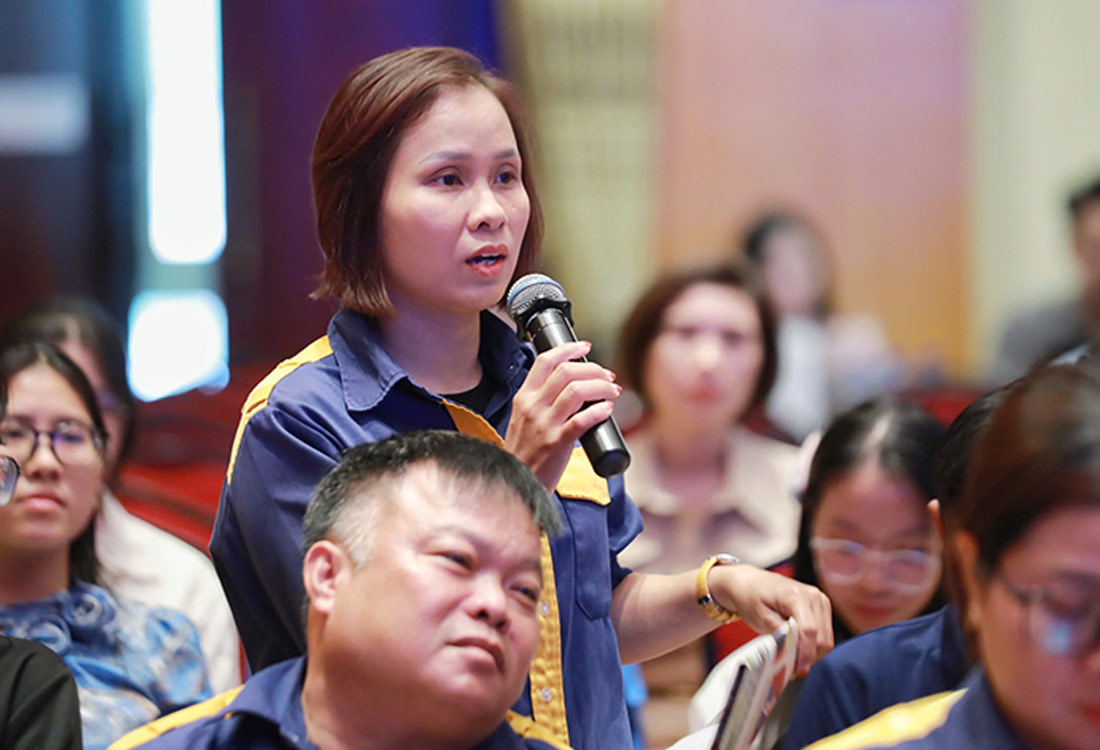
The awareness of environmental protection, occupational safety and hygiene of union officials, and occupational safety and hygiene at enterprises is one of the important key issues. How have the Vietnam General Confederation of Labor in recent times implemented training programs to raise awareness of environmental protection among workers?
Mr. Nguyen Anh Tho - Director of the Institute of Occupational Safety and Hygiene Science, Vietnam General Confederation of Labor replied:
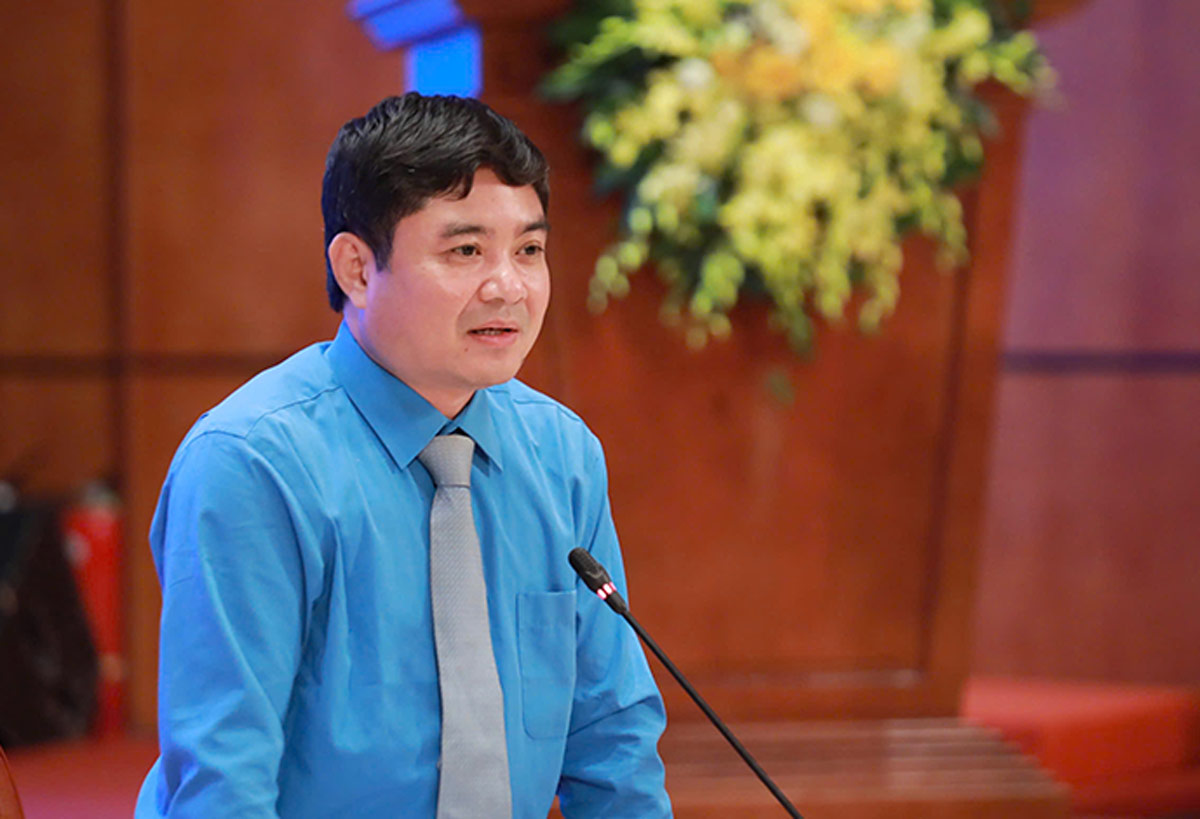
The awareness of environmental protection and occupational safety and hygiene of union officials as well as occupational safety and hygiene officials at enterprises is a key and important issue. It can be said that in the enterprise, our trade union staff plays a very important role in participating in ensuring occupational safety, hygiene and environmental protection.
Performing the role and responsibility of the organization, union officials have been regularly and daily present with management departments in the enterprise, especially the environmental safety department of enterprises to implement projects, safety and hygiene plans as well as measures to ensure safety and the environment.
Through training and coaching activities for workers and enterprises, union officials are also those who directly participate in propaganda and dissemination to the workforce in enterprises about measures, skills, and activities related to environmental protection and ensuring occupational safety and hygiene.
In recent times, the Vietnam General Confederation of Labor has annually included content to propagate, disseminate legal policies as well as train, coach, and foster knowledge and skills to ensure occupational safety and hygiene and environmental protection.
For example, in 2025, the Labor Relations Department and the Trade Union Working Department of the Vietnam General Confederation of Labor organized dozens of training classes. At the same time, documents were developed, meetings, seminars, and training sessions were organized for local trade unions and industry trade unions. From there, union officials are the core to propagate and disseminate in enterprises to millions of workers.
Through such activities, workers' awareness of environmental protection is greatly raised. In the past time, workers have protected the environment - protecting themselves very well with specific actions.
First of all, it is necessary to comply with the regulations and rules of the business to avoid littering the environment and workplace. At the same time, establish green tree planting activities and green working spaces.
And when returning home, returning to residential areas, workers also remind their relatives in the family and the community to join hands to create a safer living environment.
Every year, tens of thousands of union cadres are trained and fostered, and that is the core and core force, the core to promote environmental protection activities, ensuring safety for businesses in the recent past as well as in the coming time.
4:50 p.m.: Nguyen Minh Tue - a student at the University of Social Sciences and Humanities (Vietnam National University, Hanoi) asked.
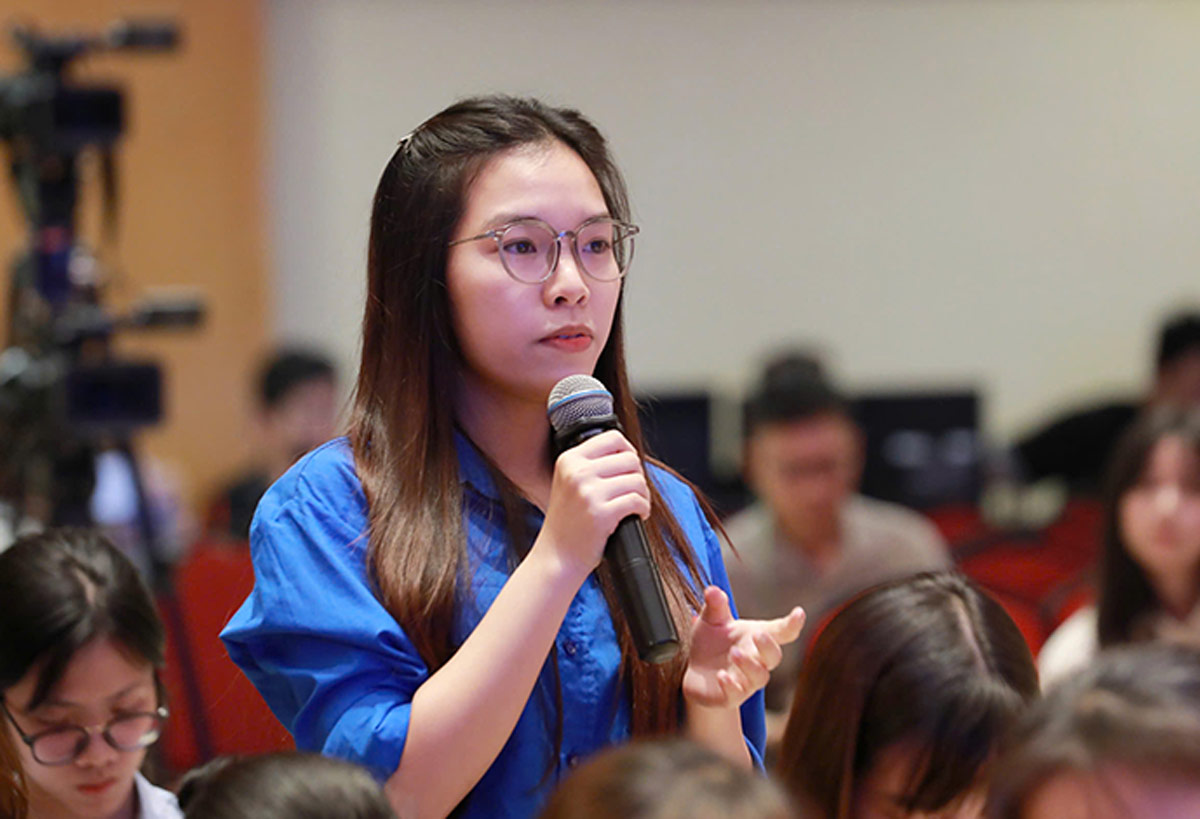
The Vietnam Volunteer Community is always a pioneer in social activities. At the A80 recently, the community's youth were very active in supporting the collection of garbage after the event. So what strategy does the community have to mobilize young people to participate in environmental protection sustainably, not just a short-term movement?
Ms. Kieu Anh - Deputy Chief of the Vietnam Volunteer Community Office replied:
Over the years, our Vietnamese volunteer community has always been a pioneer in social activities, spreading love through many meaningful programs and activities accompanying environmental workers. These activities both contribute to encouraging the spirit of our workers and joining hands to preserve the environment and protect our green planet.
In particular, at the recent A80 event, the young people of our community actively participated in garbage collection. We have mobilized more than 500 volunteers, coordinating with the team to support environmental workers in collecting garbage after the event. As a result, more than 100 bags of garbage were collected, contributing to cleaning the landscape of the central area of the capital, creating a strong spillover effect in the community and raising people's sense of responsibility for a green - clean - beautiful environment.
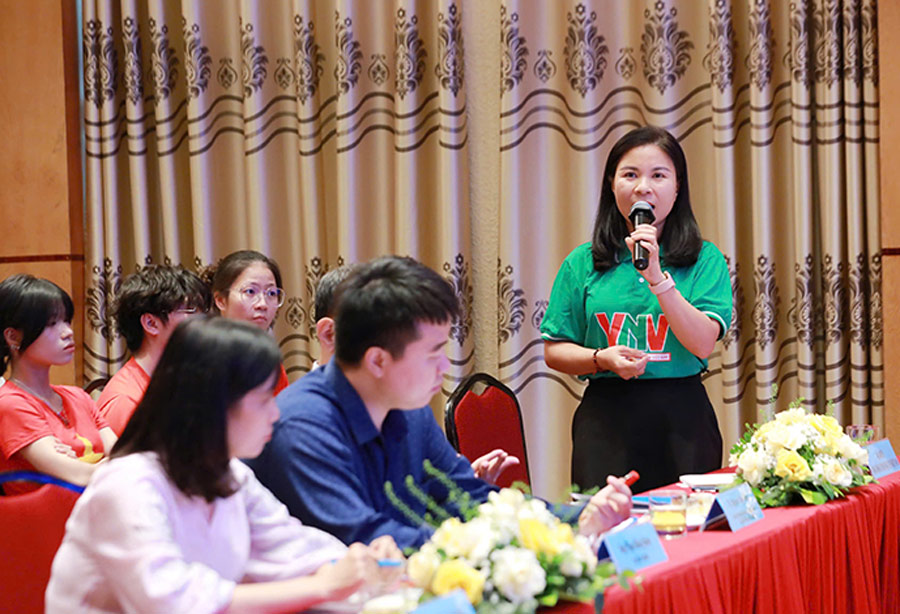
Not stopping there, the campaign also encourages many people to directly participate, from picking up small pieces of garbage to sorting garbage on the spot. The easily decomposable waste has been transferred to the Environmental Sanitation Company for treatment. This is a clear demonstration of the power of the community in environmental protection.
In the coming time, the Vietnamese volunteer community will continue to build sustainable strategies to mobilize young people to participate in long-term environmental protection movements, not just stopping at short-term activities.
We will step up propaganda and mobilize union members and young people to actively participate in programs such as "Saturday Volunteers", "Green Sunday", focusing on cleaning up the environment, clearing sewers, eliminating illegal garbage collection points, cleaning streets and residential areas. Each student will be a "green ambassador", contributing to the propaganda to family and friends to limit the use of disposable plastic items, foam boxes, plastic bags, and replace them with environmentally friendly products.
In addition, we also responded to competitions and forums such as "Send to the green future from the green tree" to arouse creative ideas of young people, towards a green - clean - sustainable future. We will continue to build models of "Green schools, green agencies", promote waste classification at source, recycle organic waste, reduce inorganic waste, and encourage the use of public transport, cycling or walking to reduce greenhouse gas emissions.
Even small tasks, if carried out regularly and widely, will certainly contribute significantly to the common goal: building a capital and a green - clean - beautiful, civilized and sustainable country.
16:35: At the forum, in the Q&A section, Ms. Luong Thi Huong, an environmental worker at Urenco 2, raised her concerns.
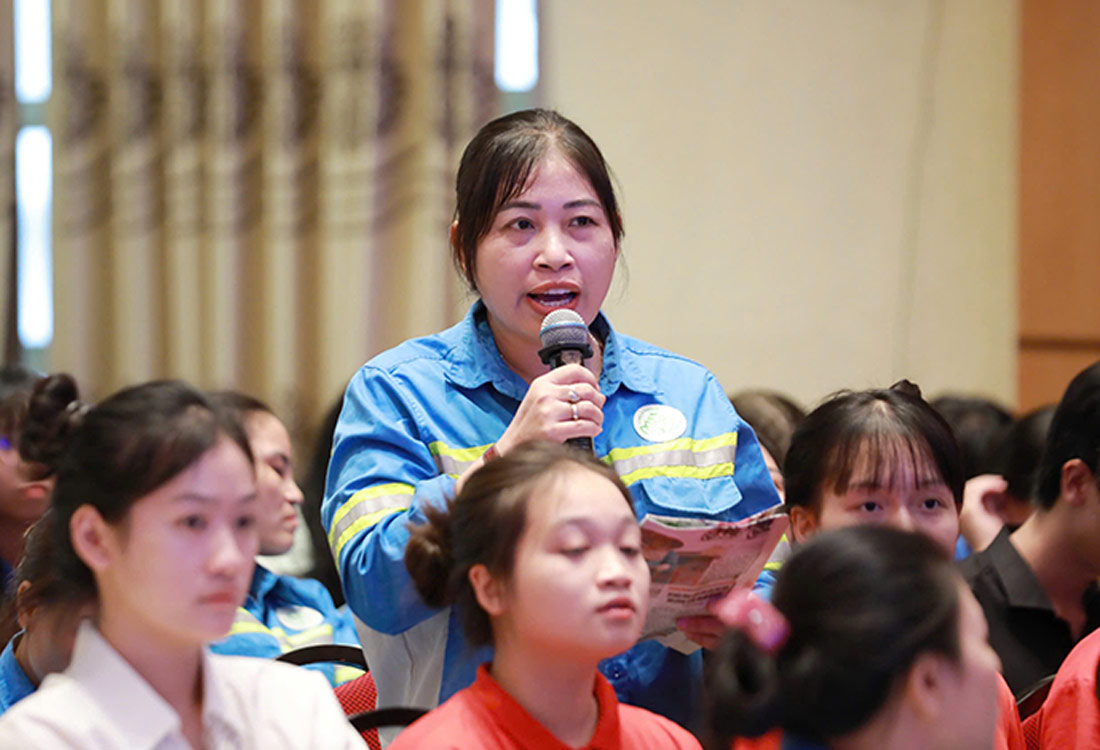
Currently, in many big cities such as Hanoi and Ho Chi Minh City, garbage collection infrastructure is still lacking. Many residential areas have only one common garbage pipe, not enough three classification bins have been arranged, and people have not been fully instructed. This causes many difficulties for collectors. So when will the new infrastructure meet practical requirements?".
Responding, Ms. Bui Phung Khanh Hoa (Waste Management Department, Hanoi Department of Agriculture and Environment) said that many old apartment buildings still maintain a system of a garbage collection pipe into the storage room, which was once convenient but has now become a "bottleneck". Meanwhile, in Japan, Singapore or Taiwan (China), apartments have eliminated this model. People there voluntarily classify the waste before bringing it to the collection point, considering it a civilized and proud act.
Ms. Hoa emphasized that Hanoi is aiming for this goal. In 2024, the city piloted waste classification at source in 5 inner-city districts, recording positive results. By 2025, the Department has issued instructions for waste classification throughout the area.
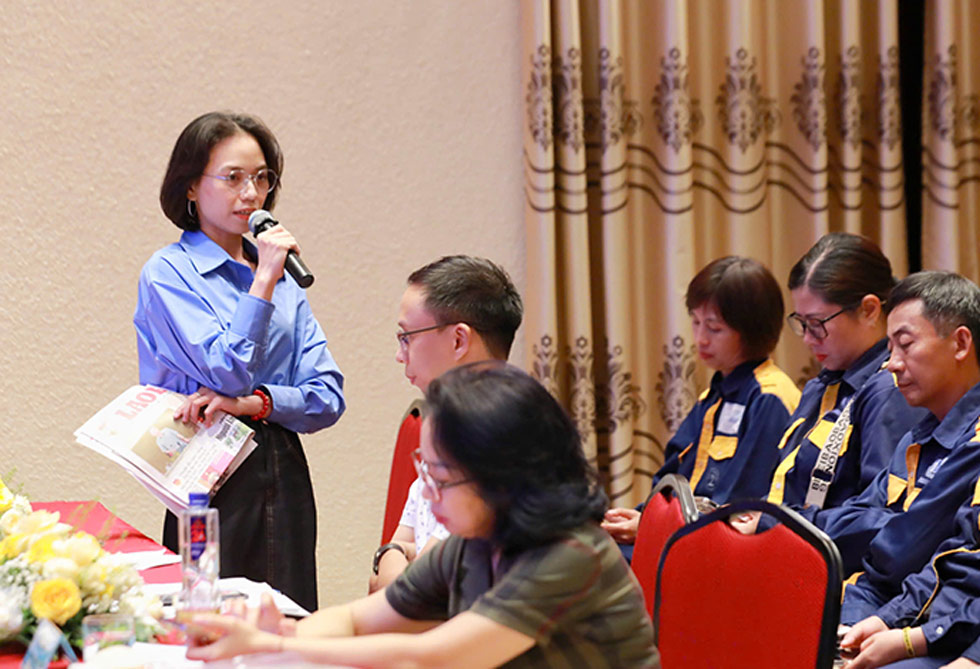
According to her, to effectively implement, it is impossible to only rely on infrastructure investment from the State but also need the support of residents and the building management board. The city encourages the socialization of the renovation and upgrading of the collection system in apartments, while promoting propaganda so that people can proactively classify waste at source.
Along with that, Hanoi is also investing in modern equipment to replace outdated tools, in order to improve the quality of environmental sanitation in communes and wards. To effectively classify waste, it is necessary to have the cooperation of both the government and the people, Ms. Hoa affirmed.
16:35: Ms. Tran Thi Hai Duc (Hanoi Drainage Company) asked a question.
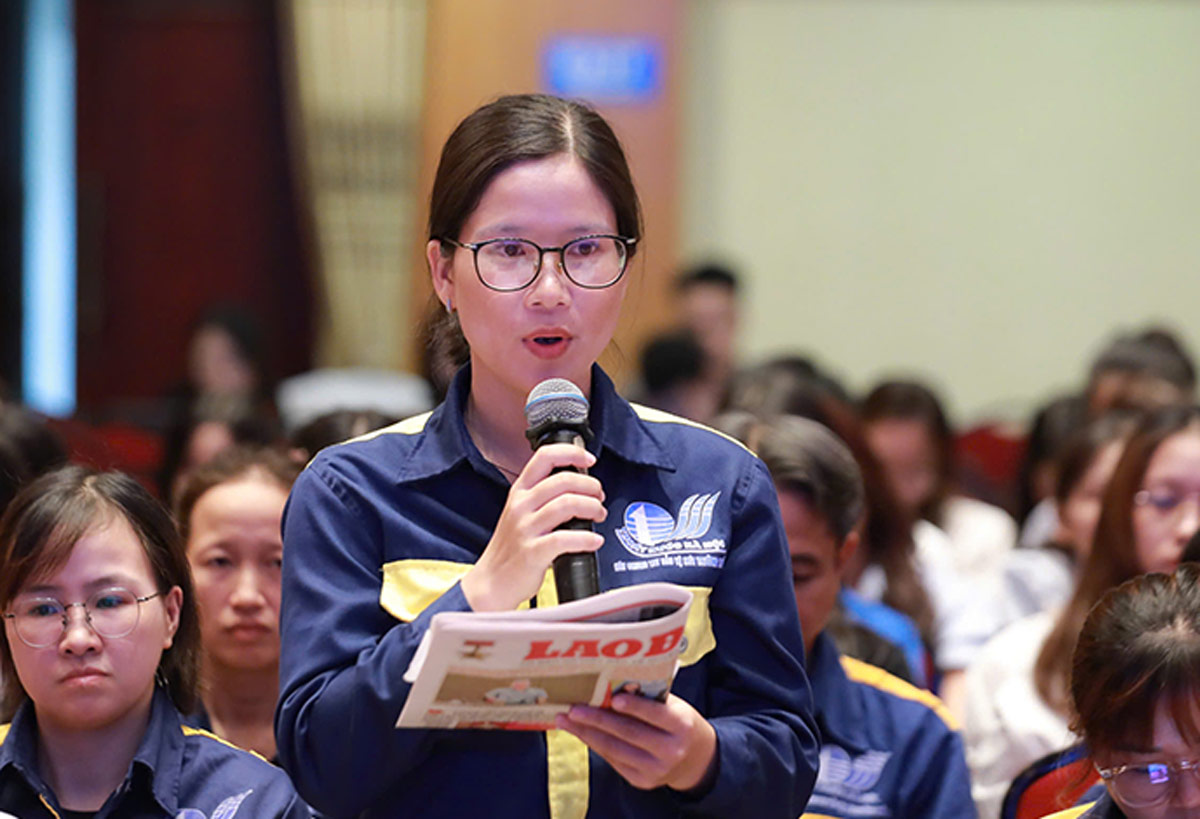
Directive 20 of the Prime Minister has raised many urgent issues in solving air pollution, in which Hanoi is assigned many tasks. The implementation of a low-emission zone is considered one of the measures for the capital to improve pollution. Can the Department of Agriculture and Environment tell us how the implementation of low-emission zones is being implemented to date and what are the problems?
Ms. Le Thanh Thuy - Deputy Head of the Department of Environmental Management, Hanoi Department of Agriculture and Environment - replied: The Capital Law stipulates the re-development of regulations on conditions and methods for implementing low-lying distribution areas. This is a new policy, aiming to rearrange means of transportation, improve air quality and reduce environmental pollution for the people of the capital.
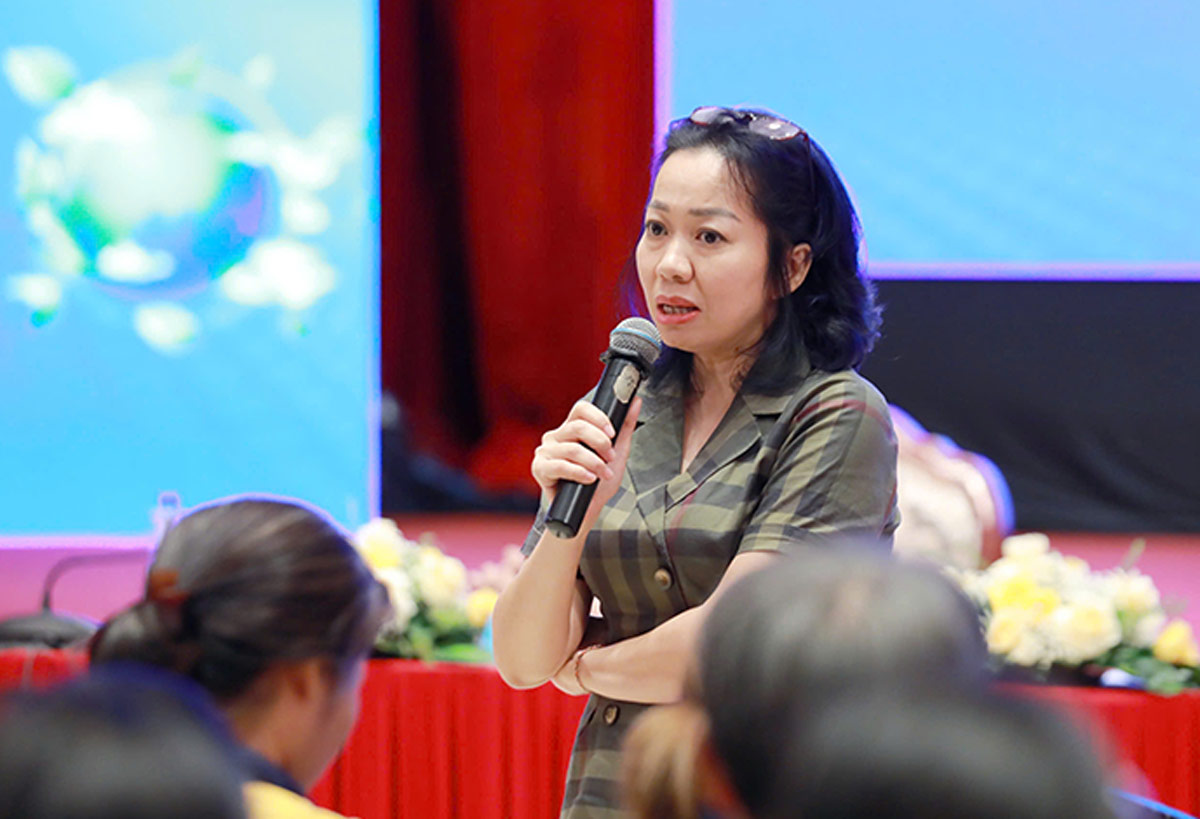
On December 20, 2024, the City People's Council also passed Resolution No. 40, which stipulates the implementation of low emission zones. Previously, the pilot was carried out in Ba Dinh and Hoan Kiem districts, but at this point we no longer have administrative boundaries for districts, the implementation plan will be expanded throughout the city, especially on Ring Road 1 and Ring Road 2.
Second, we continue to implement according to the Law on Environmental Protection 2020. One of the important contents is to gradually eliminate motorbikes using fossil fuels in the inner city area. In addition, the Ministry of Agriculture and Environment has issued technical regulations on emissions for cars participating in road traffic. These changes will be the basis for the Department of Agriculture and Environment to advise the City People's Committee to adjust and supplement Resolution 47 in the coming time.
In the previous Resolution 47, motorbikes and motorbikes exceeding emission standards will not be allowed to circulate in low emission zones. However, according to the new orientation, not only motorbikes but also mechanical vehicles using fossil fuels will be restricted to operate in this area. We are developing a detailed project for synchronous implementation, expected to be officially implemented from 2026. In addition, the City People's Committee has also assigned other departments and branches to coordinate the implementation.
I also want to send a message that any policy that wants to come into life requires the companionship and cooperation of the people. If we really want Hanoi to transform, develop sustainably, and ensure the health of the community, we need the support and cooperation of all classes of people. This is a golden opportunity for the capital to make comprehensive changes. Although there are many difficulties and challenges ahead, with united efforts, I believe that we will successfully implement these policies and put them into practice soon, for a greener - cleaner - more beautiful Hanoi.
The story of using recyclable waste as teaching materials for teachers
16:00: Mr. Nguyen Huu Quyet is currently teaching Economic and Legal Education at Huynh Thuc Khang High School (Khuong Dinh, Hanoi) and is the youngest person to receive the 2024 Hanois enthusiastic and Creative Teacher Award, nicknamed Drop Broken Decision because he often makes learning materials from waste.
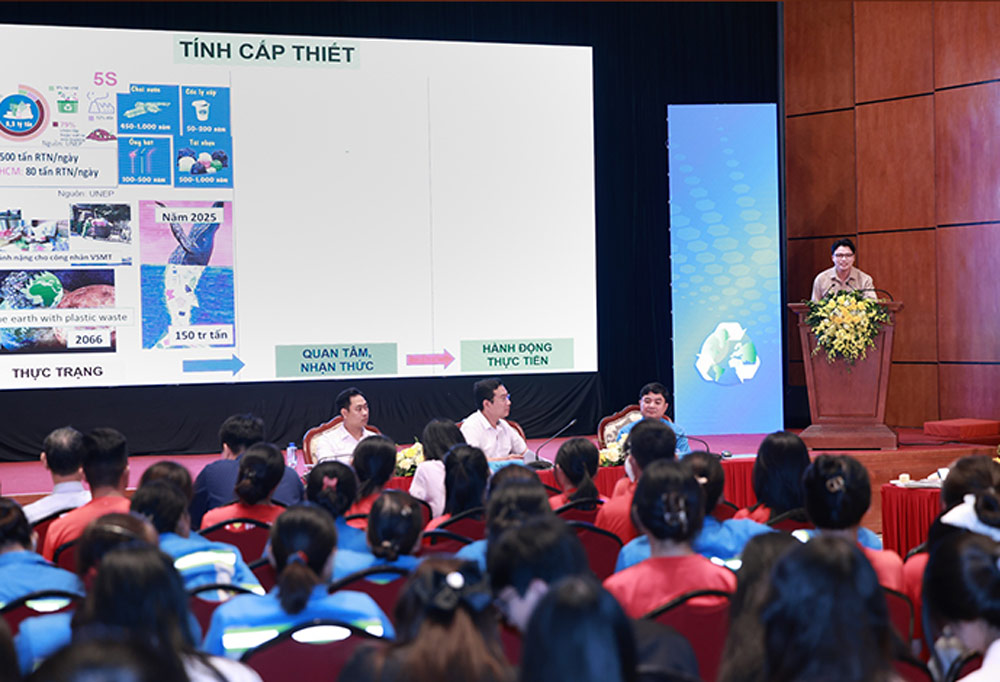
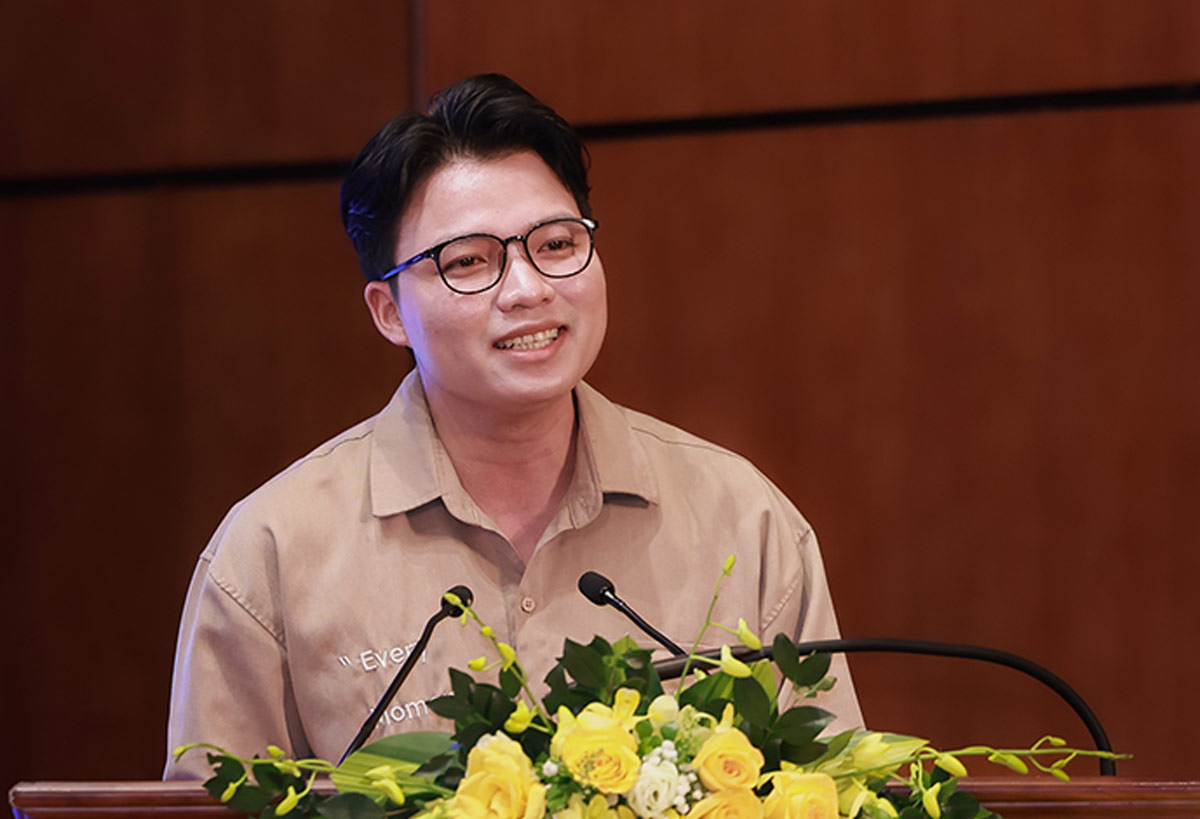
Since childhood, Huu Quyet has had the habit of observing his grandfather making homemade toys from simple household items. That image sowed Quyet's passion for creativity in his mind. Since he was a pedagogical student, Quyet has been famous for his habit of collecting scrap and getting back lost items from programs and events. Currently, Quyet has recycled waste into learning materials for students.
The project "Recycling waste for high school students" wants to spread to students; educational institutions; socio-political organizations; households; communities.
The project ensures creativity and difference, aiming to solve problems in schools, turning impossible things into possible. In particular, educating awareness of environmental protection responsibility.
has been successfully implemented from primary to high school. Implementing the following campaigns: Green one corner of the room - green study corner - green balcony; Green consumption; Building a green passport; Green recycling; Media ambassador...
The campaign wants to convey the 6T message: "Propaganda; Reduction; Reuse, Green consumption, Reuse, Increase the use of natural renewable energy".
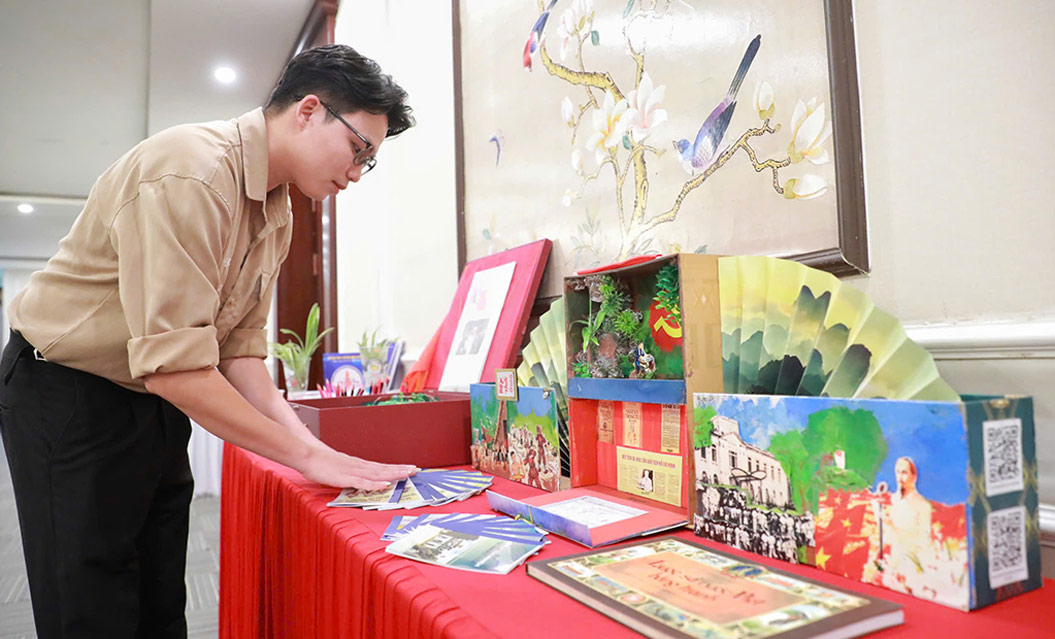
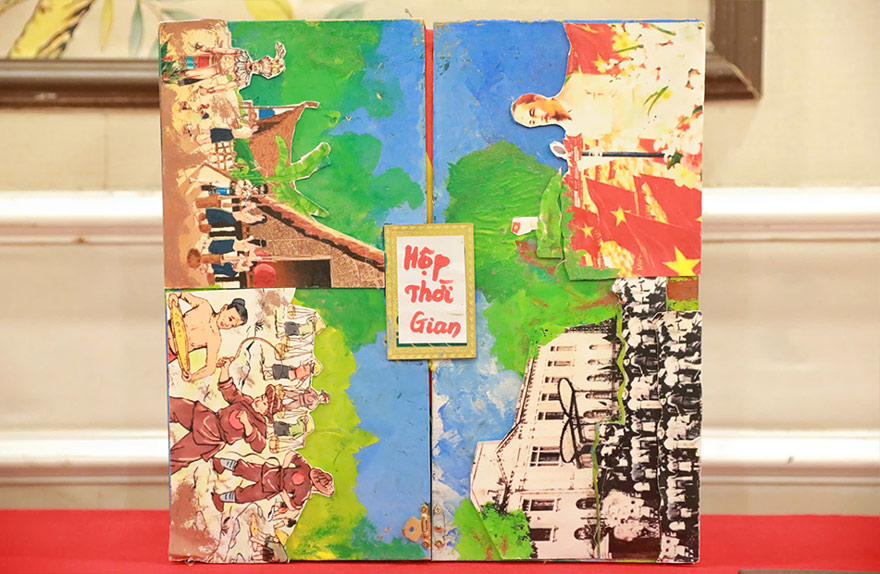
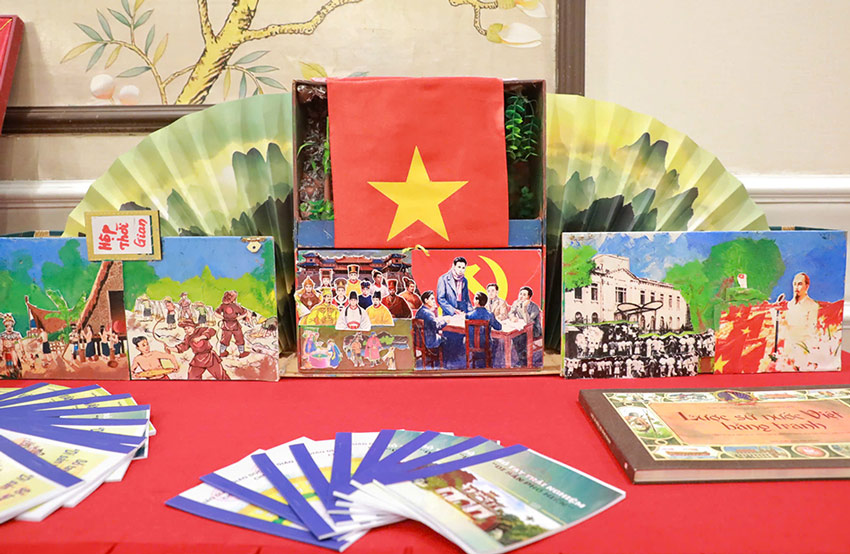
Every worker is the core of the green journey
15:45: At the forum, Dr. Nguyen Anh Tho, Director of the Institute of Occupational Safety and Hygiene Sciences (Vietnam General Confederation of Labor) presented a speech with the theme: "Vietnam Trade Union accompanies each worker on the green journey".
According to Dr. Nguyen Anh Tho, environmental pollution in many areas is complicated, directly affecting the health, lives and jobs of millions of workers.
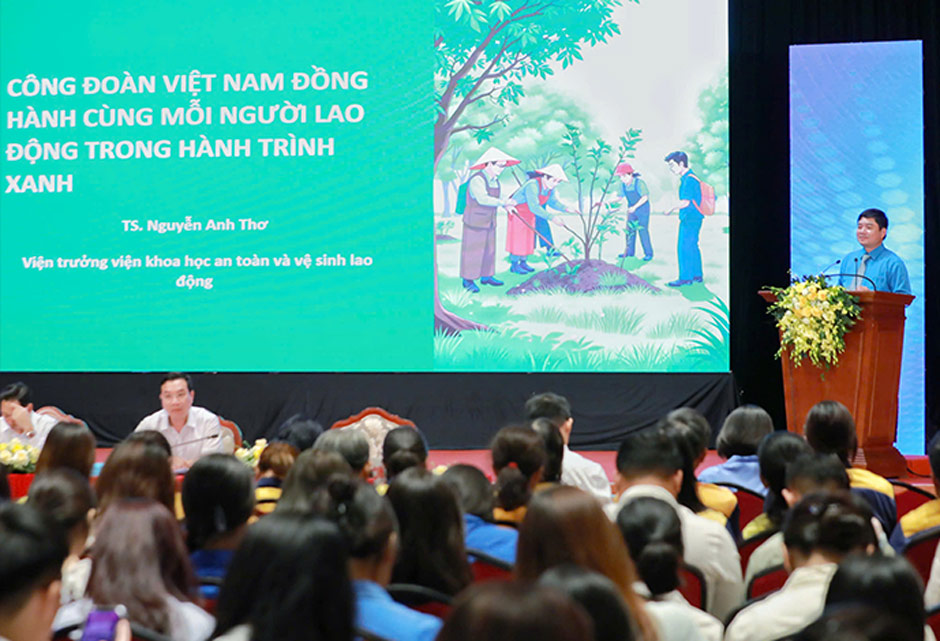
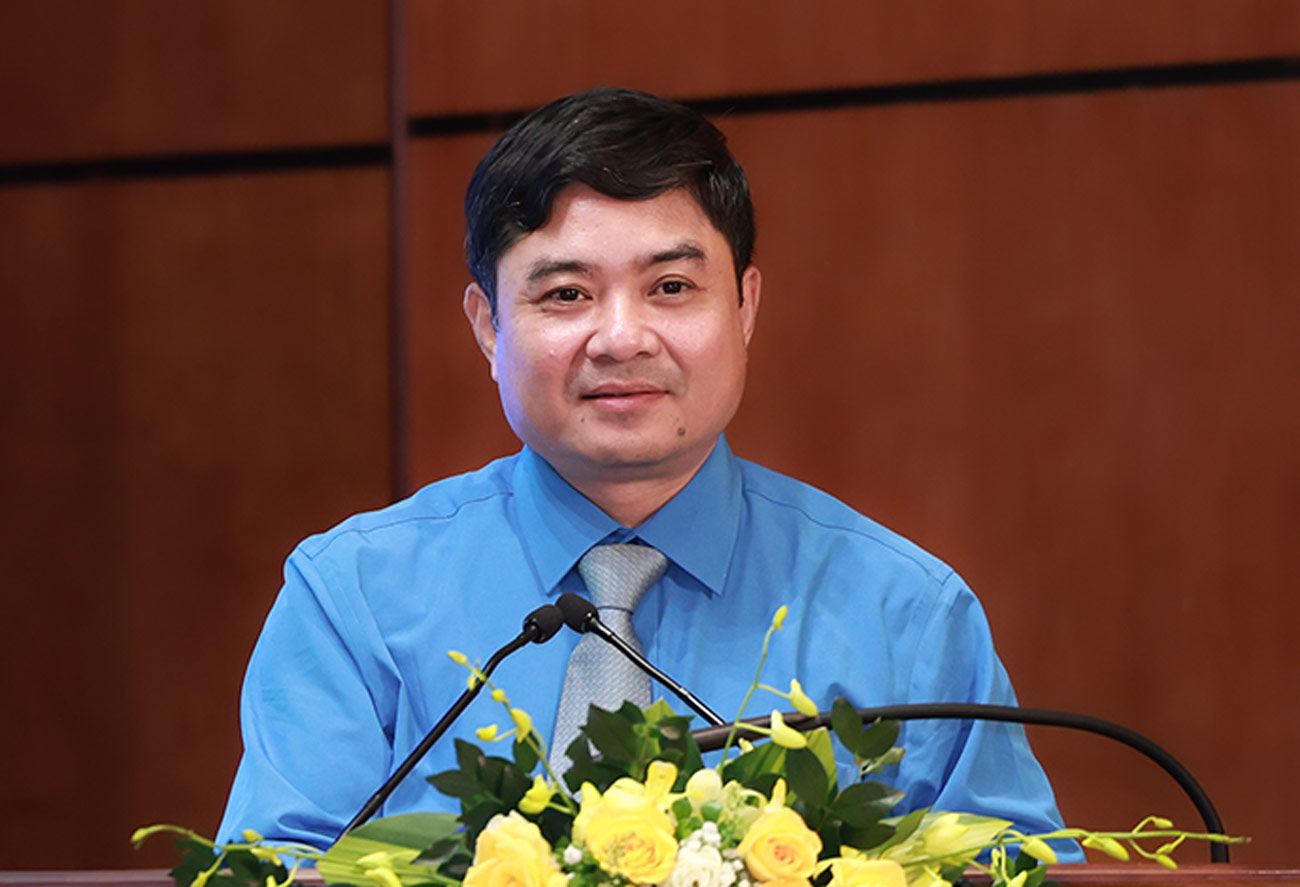
Mr. Nguyen Anh Tho cited one of the notable cases recently as the dust pollution during the work process in Nghe An, which affected hundreds of workers and killed 7 people. Mr. Tho emphasized that the working environment still has many potential risks that are difficult to recognize with the naked eye or directly feel.
In that situation, on July 12, 2025, the Prime Minister issued Directive No. 20/CT-TTg on urgent tasks to prevent and handle environmental pollution. This is a strong call, requiring the participation of the entire political system, in which the Trade Union and workers play a key role.
As an organization representing, caring for and protecting the legitimate rights of workers, the Vietnam Trade Union identifies a safe and clean working environment as the most fundamental and practical benefit of union members.
Environmental protection is not only a social task but also a common journey, where the Trade Union must become a trusted companion, an inspiration and an effective bridge.
Implementing the direction of the Ministry of Agriculture and Environment, on May 28, 2025, the Vietnam General Confederation of Labor issued Instruction No. 49/HD-TLD to synchronously deploy activities in response to World Environment Day and Environmental Action Month.
According to the report, trade unions at all levels across the country have organized 11,244 activities, attracting more than 1.13 million union members and workers to participate. Of which, 3,494 rallies, seminars, training sessions, and competitions on environmental protection were held; 229,444 leaflets, banners, slogans, and posters were printed and distributed; 5,042 radio - television programs, reports, and newsletters were held at enterprises.
In addition, grassroots trade unions coordinated with local authorities to launch many practical activities: planting and caring for more than 1.3 million trees, cleaning 7,752 km of roads, beaches, canals, collecting and treating 5,291 tons of waste (including 76 kg of batteries, 6 kg of fluorescent lamps, 131 kg of plastic waste), releasing 50,000 aquatic fish, and at the same time starting and handing over 346 environmental protection works.
Dr. Nguyen Anh Tho emphasized that each worker can contribute to the green journey through small daily actions such as saving energy, taking advantage of natural light; Limiting plastic waste, using water bottles and personal lunch boxes; Classifying waste at source; Prioritizing "green transportation" such as buses, general vehicles, zero-emission vehicles; Saving resources from printing paper, water to production materials.
Workers also need to boldly reflect on polluting behavior, propose initiatives to improve production, reduce emissions and improve competitiveness for businesses.
To prevent individual actions by workers, Dr. Nguyen Anh Tho said that the Vietnam Trade Union has implemented five groups of solutions.
First, promote the organization of dialogues and competitions, and replicate the model of "Green Trade Union Group" and "Workers for the Environment".
Second, launch an emulation movement associated with green criteria: include environmental criteria in the movement "Good workers, Creative workers", promptly reward outstanding individuals and groups.
Third, strengthen supervision and social criticism: Grassroots trade unions will proactively participate with enterprises in developing and implementing environmentally friendly production processes. At the same time, exercise the right to supervise compliance with environmental laws, occupational safety and hygiene of enterprises; Participating in building environmentally friendly production processes, supervising compliance with laws.
Fourth is to include environmental content in the Collective Labor Agreement, add a commitment to reduce noise, dust, temperature, equip environmentally friendly protection, and encourage travel by public transport.
Fifth, mobilize resources, cooperate in many sectors, coordinate with management agencies, social organizations, and experts to train and improve the capacity of union officials and workers.
At the end of the discussion, Dr. Nguyen Anh Tho affirmed that the "Green Journey" is a long-term process, requiring perseverance and cooperation of the entire political system, businesses and workers. In the spirit of Directive 20, the Vietnam Trade Union is committed to working with union members to build a safe working environment, a sustainable society and a green Vietnam for the present and the future.
Deploying IoT sensors to monitor trash bins, coordinating automatic collection
15:30: Presenting a speech with the theme "For a clean - civilized - modern Hanoi", Mr. Tran Quang Anh, Head of the Technical Planning Department of Urenco Hoan Kiem branch emphasized that environmental protection and urban order management are key political tasks, contributing to improving the quality of life and preserving the image of the capital.
According to Mr. Anh, in recent years, environmental sanitation work has achieved many positive results such as gradually being automated, many streets becoming cleaner and more beautiful, the general cleaning movement is maintained regularly, attracting a large number of cadres, party members and people.
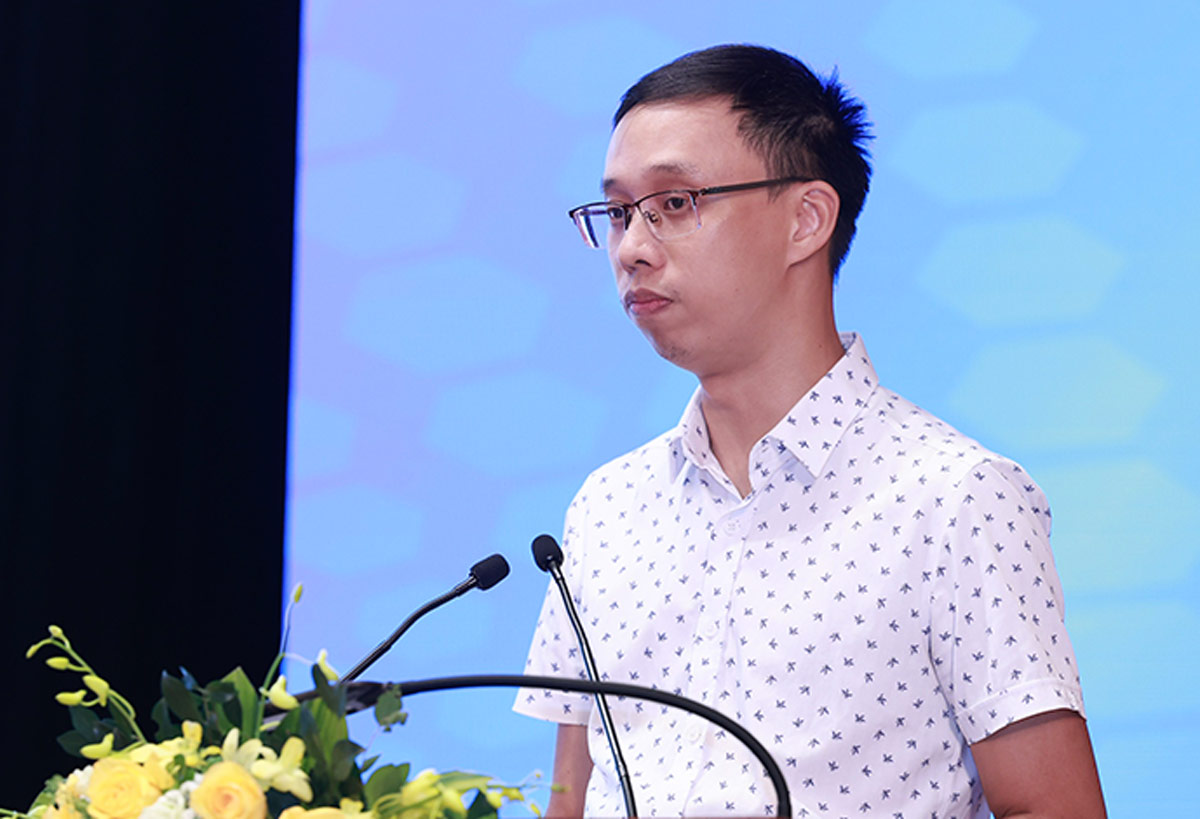
However, there are still limitations such as unsynchronized infrastructure, old vehicles, low Mechanization rate; a part of people and businesses have not complied with regulations; propaganda work has not been extensive.
The main reason comes from the rapid urbanization, outdated collection methods, low community awareness, and limited sense of responsibility of a part of cadres and workers.
Speaking about the topic of the discussion "For a clean - civilized - modern Hanoi", Mr. Anh explained, "Clean" means no more old vehicles, dirty gathering places; roads and sidewalks are regularly swept and washed, garbage is thrown in the right place, at the right time.
"Civil - modern" is to replace manual collection by automating, using electric vehicles to reduce emissions; waste is classified at source, packaged properly; applying digital technology in management, operation and supervision.
The three key groups of solutions raised by Urenco Hoan Kiem branch representatives at the forum include:
First, for units maintaining environmental sanitation, it is necessary to invest in modern equipment. In which, replace open-top collection vehicles with closed composite boxes (preventing leakage and odor); put into use specialized green vehicles such as garbage collection electric vehicles..., build modern transit infrastructure, develop a waste classification system at source.
Applying smart technology and combining GPS with AI to optimize waste collection routes; applying electronic cleaning fee collection; deploying IoT to monitor trash bins and coordinate automatically. At the same time, electronic cleaning fees were collected.
Enhancing human responsibility, cleaning workers must be professional, knowledgeable about technology and environmental laws; people must dump garbage at the right time and place; the community must actively participate in the general cleaning movement.
Strengthen cooperation, mobilize social resources, develop PPP models, coordinate technology enterprises and institutes to research and deploy advanced waste treatment solutions.
On the management agency side, it is necessary to issue a process and norms for cleaning services suitable to actual costs; build a data sharing mechanism between the operating unit and the grassroots government; strengthen transparent and timely sanctions; arrange a budget and incentive mechanisms for green investment.
As for agencies, organizations, and communities, according to Mr. Anh, promote diverse propaganda, build model points in schools, agencies, residential areas, etc., combined with integrating content on urban order; attach environmental sanitation criteria to the assessment of cadres and Party members; maintain the "Green weekend" movement into a cultural lifestyle.
Concluding the discussion, Mr. Tran Quang Anh affirmed that in order for the goal of "For Hanoi to be bright - green - clean - beautiful" to become a reality, cadres and Party members must be pioneers and exemplary; sanitation workers must become the core force; the people must be the companion.
Hanoi Urban Environment Company Limited is committed to continuing to innovate, apply technology, promote a sense of responsibility to build a green - clean - civilized - modern capital, on par with advanced cities in the region.
Household waste management in localities still has many shortcomings, causing great pressure on environmental staff
15:20: Mr. Ho Kien Trung - Deputy Director of the Department of Environment, Ministry of Agriculture and Environment - said that in the recent past, the management of household waste in localities still has many shortcomings, causing great pressure on the team of environmental staff.
The trend of waste generation is increasing, while the selection and bidding of collection, transportation and treatment units is still facing many difficulties. Previously, the province and the city directly took on the responsibility, but now they have transferred it to businesses and service units according to local regulations. This creates certain problems in organizing implementation.
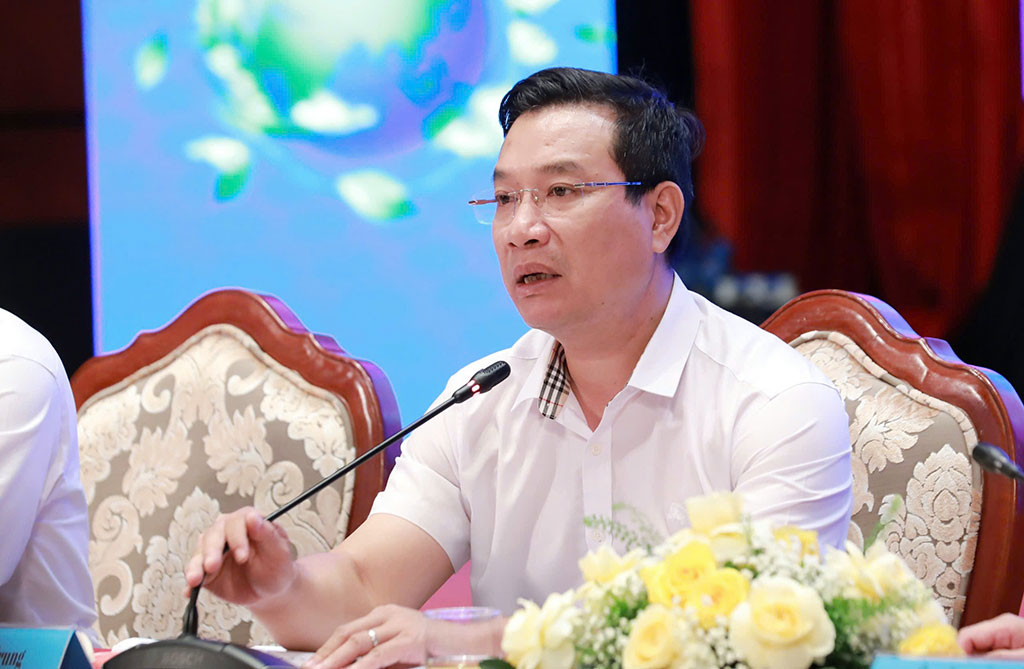
One of the major difficulties at present is the problem of waste collection, transportation and treatment service prices. This price is developed and issued by localities, but there is still a lack of consistency, many places are not suitable for actual payment capacity. Some provinces have issued specific fee levels, but most localities are still struggling to determine prices corresponding to processing costs, causing many obstacles in implementation.
In addition to the shortcomings, we have also recorded some positive results. After more than three years of implementing the Law on Environmental Protection 2020, the amount of landfill waste has decreased significantly. If the landfill rate previously accounted for over 80%, now it is only about 59%, a decrease of more than 20%. This is a positive signal, showing a change in waste classification, collection and treatment. At the same time, processing and recycling capacity has also been enhanced.
In particular, many domestic and foreign enterprises have participated in investing in the field of waste recycling and treatment. There are currently 14 new waste treatment plant projects being implemented, with the participation of both Vietnamese and foreign enterprises. This is a positive signal, opening up prospects for improving management capacity, reducing the burden on the budget and creating more sustainable development opportunities.
In short, despite many difficulties in mechanisms, service prices and implementation, the management of household waste in our country has made remarkable progress. In the coming time, it is necessary to continue to improve policies, encourage socialization, raise public awareness and promote the application of modern technology to effectively treat waste, contributing to building a green, clean and sustainable environment.
Workers are environmental propagandists at workplaces and residences
15:05: Presenting a speech on "Waste management after merger in conjunction with Directive No. 20/CT-TTg of the Prime Minister" at the forum, Ms. Tran Thi Thu Hien, Department of Waste Management (Department of Environment, Ministry of Agriculture and Environment) emphasized that the consistent guiding spirit of Directive 20 is to increase waste classification at source, considering this a key task to reduce treatment loads, promote recycling, save resources and move towards a circular economy.
According to Ms. Hien, Directive 20 requires innovation of management mechanisms, improving the responsibility of local authorities, waste collection and treatment service enterprises as well as mass organizations.
Workers are both the arising subject and the pioneer in waste classification, while playing the role of "environmental propagandist" at the workplace and residence.
At the same time, promote socialization and waste classification to move towards a circular economy.
Regarding the status of household waste management after the merger, Ms. Tran Thi Thu Hien informed that in 2024, the total volume of household waste (RTSH) generated nationwide will reach 69,406.53 tons/day, of which urban areas account for 53.67% and rural areas account for 46.33%. The average collection rate reached 90.7%, urban areas alone reached 97.28% (exceeding the target set by the National Assembly).
According to Ms. Hien, there are currently 1,549 domestic solid waste treatment facilities nationwide, but most of them still rely on landfill (64%), while modern technology such as waste incineration for power generation, biological culture or recycling accounts for a low proportion.
After the merger, the amount of waste increased rapidly, many localities encountered difficulties due to the expansion of the area but the collection, transportation and treatment infrastructure was not adjusted in a timely manner, leading to overload.
In addition, the awareness of waste classification of a part of the people and workers is not high, the technical infrastructure is still lacking in synchronization, while transportation costs have increased sharply. In addition, many unsanitary landfills continue to be a big challenge.
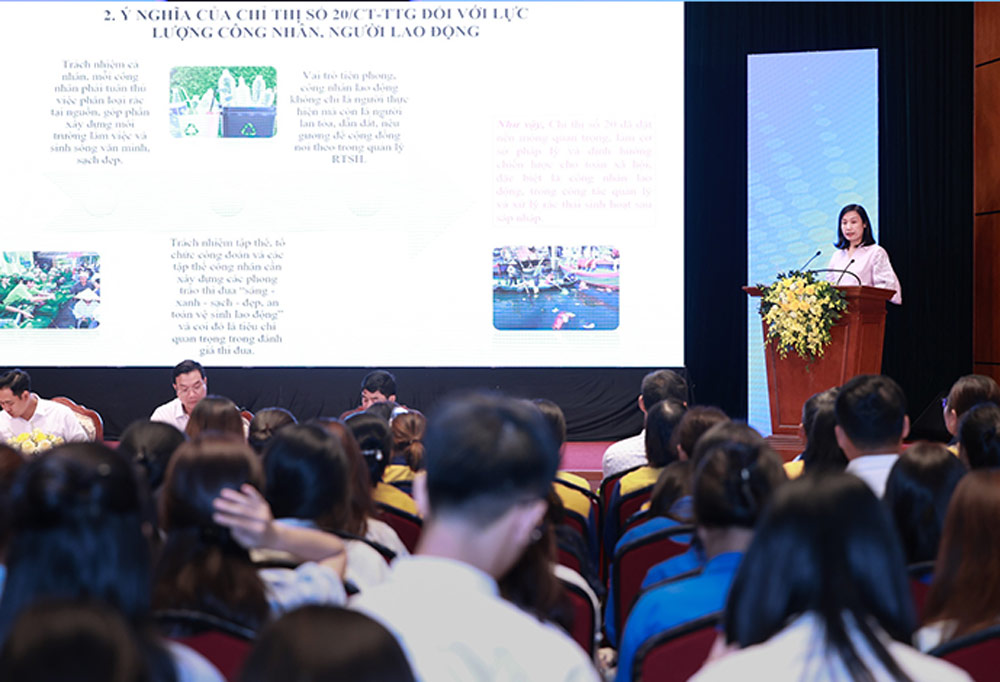
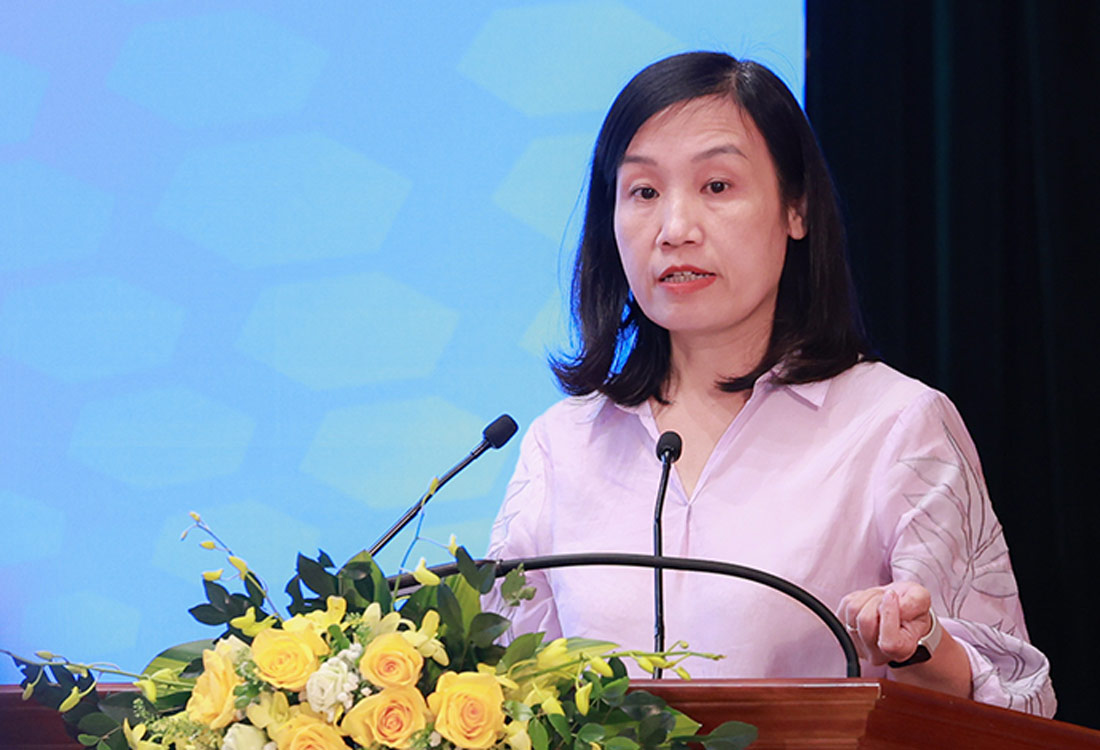
To improve management efficiency, Ms. Hien proposed 7 groups of solutions:
- Complete mechanisms and policies: supplement appropriate regulations after the merger, adjust service fees to accurately reflect costs. Concretizing the responsibility between local authorities, environmental service enterprises, residential groups and trade unions in managing household waste. At the same time, increase sanctions and rewards.
- Invest in collection - transportation infrastructure: expand gathering points, equip specialized vehicles, apply smart management technology. Strengthen labor protection for workers in environmental sanitation, improve working conditions and increase productivity.
- Innovating treatment technology: encouraging waste incineration for power generation, recycling, building modern complexes, gradually reducing landfill to less than 50%.
- Promote source classification: synchronously deploy in households, schools, public places, and monitor the collection process.
- Promoting the role of workers: The role of workers is very important. It is necessary to organize training, the "Green Workers' Group" movement, and include environmental criteria in emulation evaluation.
- socialization and public-private partnership: attracting businesses to invest, applying extended producer responsibility (EPR), enhancing international cooperation to receive modern technology and advanced management models.
- Raising public awareness: Promoting diverse communication; launching a movement for the whole people to classify and collect waste; integrating environmental education in training and building a model of "Workers for the Environment" to spread and replicate typical examples.
To effectively and sustainably manage household waste, there needs to be a commitment to action from the State, local authorities, enterprises, trade unions, workers and the whole society. Each citizen needs to consider environmental protection as their practical duty and rights, Ms. Hien emphasized.
15:00: Mr. Ho Kien Trung - Deputy Director of the Department of Environment, Ministry of Agriculture and Environment - said that the Law on Environmental Protection 2020 after a few years of being put into practice has shown many new points, while also posing many difficulties and challenges in the implementation process in localities.
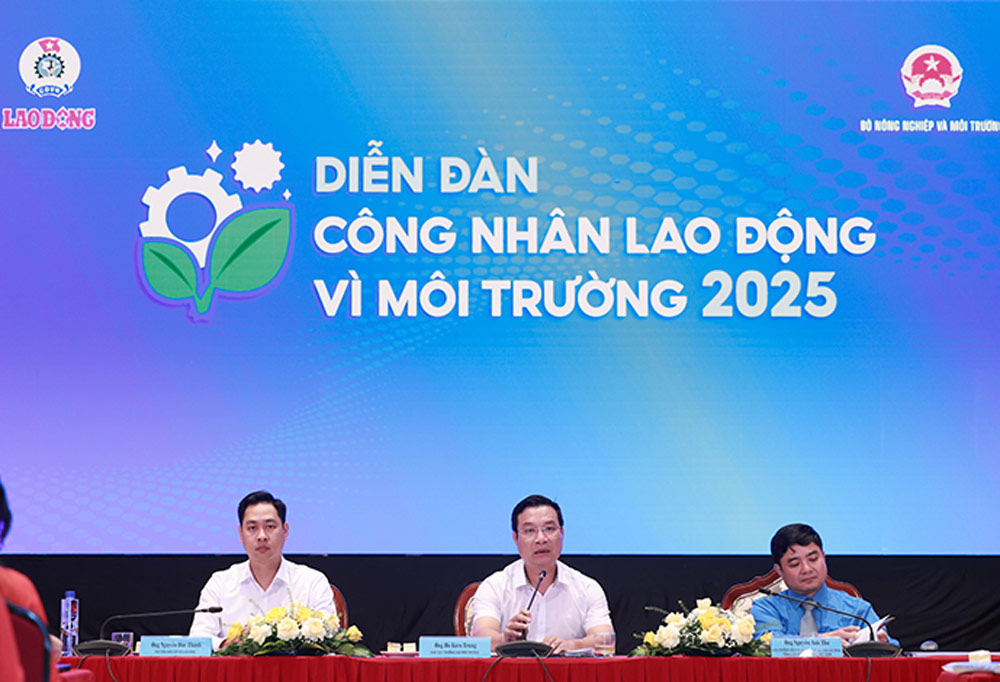
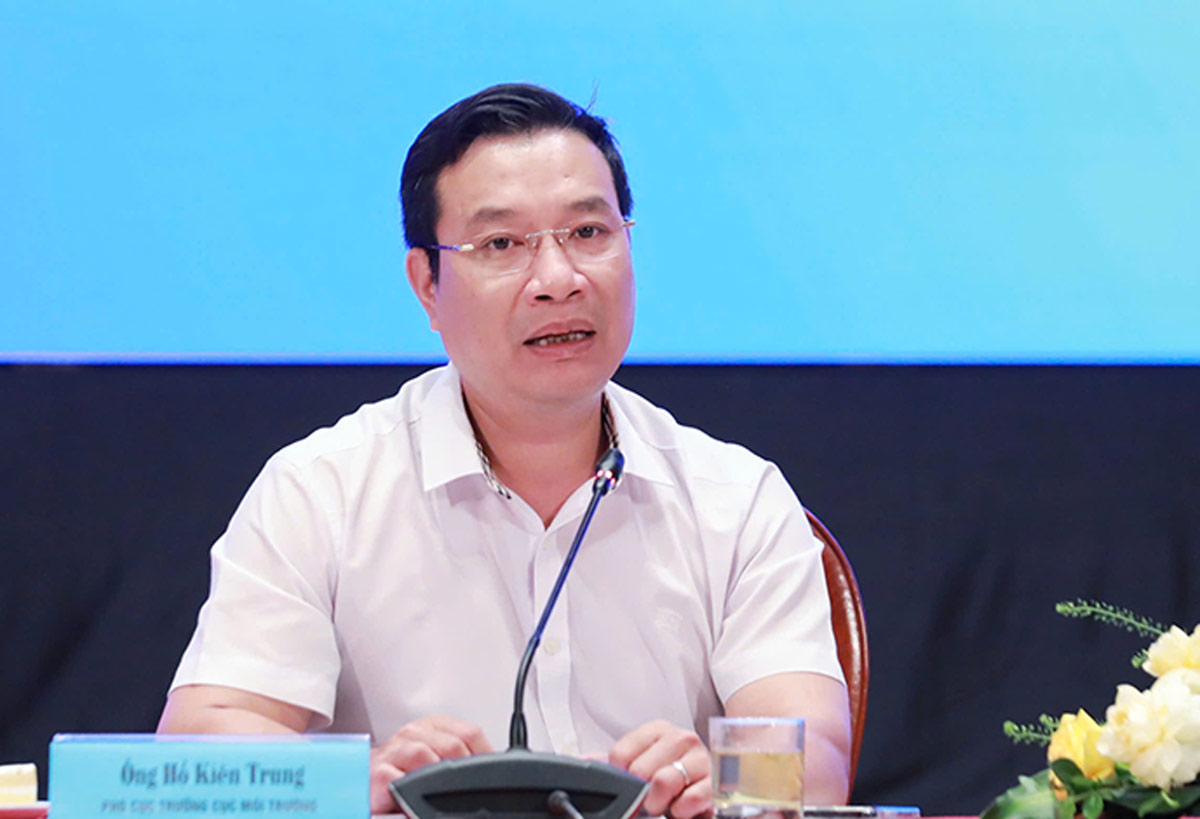
Looking back at reality, it can be seen that Lao Dong Newspaper has made many efforts to accompany, reflect and spread environmental issues, but there are still many things that need to be further promoted. The cause comes from a number of factors:
Firstly, the work of collecting, transporting and treating waste in many localities still faces many difficulties, not meeting practical requirements.
Second, although the awareness of the community has been raised, it is not uniform. A part of the people have not really paid attention to their rights and responsibilities in environmental protection, leading to the classification and treatment of waste at source not being seriously implemented.
Third, the current price of domestic waste collection, transportation and treatment services is not suitable for the affordability of many localities. The determination of fee levels, payment mechanisms and implementation are still inadequate, causing difficulties for management.
In reality, in some places, the collection, transportation and treatment of waste is still not guaranteed, and there are many potential risks affecting people's lives. Hanoi and some other provinces and cities are also gradually perfecting the mechanism, preparing to issue and apply new regulations to manage waste more closely and effectively.
Hanoi - "Golden time" to transform against environmental pollution
14:40: Ms. Le Thanh Thuy - Deputy Head of the Department of Environmental Management, Hanoi Department of Agriculture and Environment - said that Hanoi is considered a key area, which needs to be a pioneer in piloting pollution control policies, especially in transportation and industry, associated with transforming the green development model, reducing emissions and improving the quality of life for people.
Accordingly, Directive No. 20/CT-TTg dated July 12, 2025 of the Prime Minister on a number of urgent and drastic tasks to prevent and resolve environmental pollution has promptly created a "policy boost" of a breakthrough not only in Hanoi in environmental protection. This is a "golden opportunity" for Hanoi to look back, restructure its development strategy towards sustainability, both ensuring economic goals and effectively controlling environmental pollution.
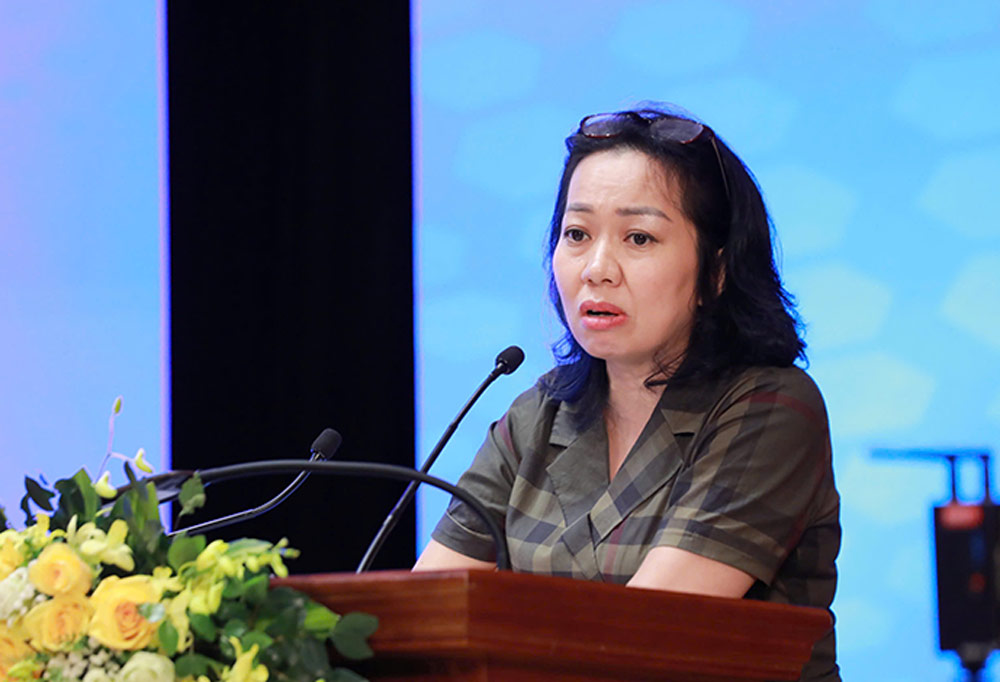
Ms. Thuy emphasized the context and significance of Directive No. 20/CT-TTg. The first affirms the high political determination of the Government in overcoming shortcomings and limitations in direction and management, in overcoming environmental pollution nationwide; demonstrating the high determination of all levels and sectors in implementing strategies, projects, projects, and tasks on environmental protection; ensuring the principle of "6 clear: clear people, clear work, clear time, clear responsibilities, clear products, clear authority".
Second is the specific action orientation for localities, in which Hanoi is considered a key area, which needs to be a pioneer in piloting pollution control policies, especially transportation and industry in transforming the green development model, reducing emissions, improving the quality of life; focusing on removing "bottlenecks", perfecting the environmental protection institutions of the Central and local governments to improve the effectiveness, efficiency of implementation and in line with the arrangement of the apparatus in the political system and the 2-level government model.
Third is to create a legal basis and synchronize management tools so that not only Hanoi but also the whole country can implement stronger measures: from tightening emission standards, limiting motorbikes using fossil fuels, to accelerating the progress of renewable energy conversion; forming low-emission zones following the trend of converting vehicles using green energy and clean energy in the city.
The Deputy Head of the Environmental Management Department, Hanoi Department of Agriculture and Environment also said that this is a golden opportunity for Hanoi to transform.
Directive 20/CT-TTg not only sets long-term goals but also has a specific roadmap and targets, creating conditions for Hanoi to plan policies, strategies and long-term implementation plans, feasible for the capital's environmental protection activities; in order to achieve the targets set by Hanoi under the Capital Law and under the direction of Directive 20/CT-TTg of the Prime Minister.
The people of the capital have been clearly aware of the negative impacts of environmental pollution on health, creating pressure and motivation for the government to take drastic action.
Hanoi has access to scientific resources, green technology, and global climate finance funds to implement innovative solutions.
Hanoi not only solves environmental problems for itself, but also has the responsibility to set an example and pave the way for other cities to learn.
Regarding Hanoi's key orientations and solutions, Ms. Le Thanh Thuy said that, implementing Directive No. 20/CT-TTg dated July 12, 2025 of the Prime Minister on a number of urgent tasks, drastically preventing and resolving environmental pollution; the Hanoi Party Committee has directed the City People's Committee to proactively develop and promulgate a Plan of the City People's Committee to implement Directive No. 20/CT-TTg to specify 11 general tasks at the provincial level and 9 specific tasks of Hanoi City in Directive No. 20/CT-TTg dated July 12, 2025, develop a detailed and clear roadmap, assign specific responsibilities and have a mechanism for close coordination between departments, branches, sectors and localities to proactively and drastically implement annual environmental protection solutions or roadmaps (2025-2030) to contribute to improving the quality of life of the people in the capital to contribute to improving the quality of the environment.
Currently, the draft Plan to implement Directive 20/CT-TTg of the City People's Committee is being submitted by the Department of Agriculture and Environment to the City People's Committee for consideration and decision; in which it has been determined:
- 4 specific target groups that need to be monitored by 2030 need to be concretized into 23 component indicators in the fields of: collection, treatment of wastewater, air and emissions, solid waste, development of the "green" transport system. In which: 15 targets proposed the highest level (100%), 5 targets higher than the national general regulations (treatment of urban wastewater, waste, buses using green energy); 3 specific targets of the city (wastewater treated in the inner city area, reducing dust in construction sites).
- groups of contents, including:
Review and develop mechanisms and policies in the field of environmental protection and development of a "green" transport system.
Strengthen management, improve the quality of environmental impact assessment report appraisal, grant environmental licenses; strengthen control of waste sources, environmental pollution sources and publicize information on environmental protection activities in the city.
Strengthen inspection and examination work; promptly detect and strictly handle violations of the law in the environmental field.
Strengthen environmental protection activities in 4 areas: Air; Water; solid waste; Craft villages.
Applying science and technology, innovation and digital transformation in pollution treatment and environmental protection.
Strengthen propaganda, raise awareness of all levels, sectors and people of the capital about environmental protection.
Focus on mobilizing investment and financial resources and enhancing socialization for environmental protection and international cooperation.
Regarding the development of a legal framework and policy mechanisms on the environment: it is expected to develop and promulgate 27 documents in the 2025-2026 period, including: 10 Resolutions of the City People's Council, 3 Decisions of the City People's Committee, 12 mechanisms and policies submitted to the City People's Council and People's Committee issued according to their authority and 2 specialized regulations; recommended that central agencies study and promulgate 4 documents so that localities have a basis to effectively implement Directive No. 20/CT-TTg dated July 12, 2025 of the Prime Minister in the capital.
Accordingly, within the scope of the proposed plan, 27 priority programs and tasks need to be implemented according to the roadmap until 2030, assigning 12 units to preside over implementation.
Ms. Le Thanh Thuy - Deputy Head of the Environmental Management Department, Hanoi Department of Agriculture and Environment emphasized that the golden opportunity has come, demonstrating high political determination from the central level, receiving the attention of all levels, sectors and the entire community in the capital, which is both a favorable and a challenge to create a strong change in the environmental protection of the capital, but if not thoroughly utilized, Hanoi will miss a valuable opportunity to make a breakthrough in environmental protection.
Therefore, it is necessary to:
Resolutely take action, do not let the targets stop at the document.
Clearly allocate responsibilities, link environmental results with assessing the level of task completion of each level and each industry. Strengthen the responsibility of authorities at all levels, especially the leaders in directing the implementation of the Party and State's guidelines, policies and laws in environmental protection and sustainable development of the capital.
Proactively take a step forward, turning Hanoi into the "green capital" of Southeast Asia.
kidex 20/CT-TTg has opened the door, whether or not to seize this golden opportunity depends on the determination and consensus of the entire political system and people of the capital - Ms. Thuy emphasized.
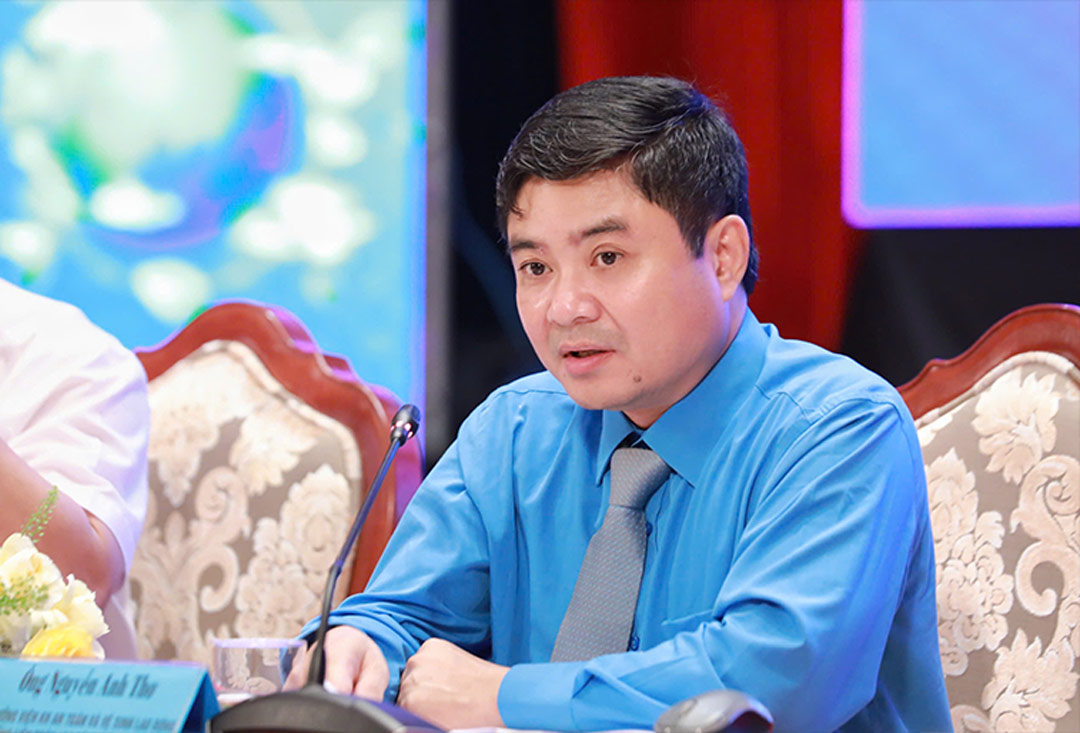
Using drones to monitor pollution points
14:20: Mr. Pham Hong Quan - Department of Environment, Ministry of Agriculture and Environment presented a speech "Answered action to combat environmental pollution, return the sky to green".
Mr. Pham Hong Quan said that air pollution in the North has a clear legal status, often concentrated and becoming more serious in winter and spring, from October of the previous year to April of the following year. This is the period when adverse meteorological factors such as temperature difference and wind disturbances appear frequently, creating a protective layer that makes it difficult for pollutants to diffuse, accumulates in the air mass close to the ground and causes prolonged pollution.
The main sources of emissions causing air pollution are transportation. With a huge number of personal motor vehicles, many used vehicles do not meet emission standards, in addition to emissions from exhaust pipes, road dust carried by vehicles and secondary dust preparations also contribute to increased urban air pollution.
The second source is industrial production. Thermal power plants, cement plants, steel processing plants and many other production facilities, especially in provinces neighboring Hanoi, have been identified as contributing significantly to the level of PM2.5 fine dust in the air.
The third is the construction and incineration activities. Dust from construction sites, demolition, and transportation of materials that do not cover in accordance with regulations is still common. Notably, the situation of burning straw after harvest or burning household waste spontaneously in the suburbs and rural areas is also an important source of emissions, requiring drastic measures to control.
In particular, in the last months of the year, when construction, production and trade accelerate, emissions increase simultaneously. Combined with unfavorable weather conditions, this situation has created serious pollution, deeply affecting people's health and lives" - Mr. Quan said.
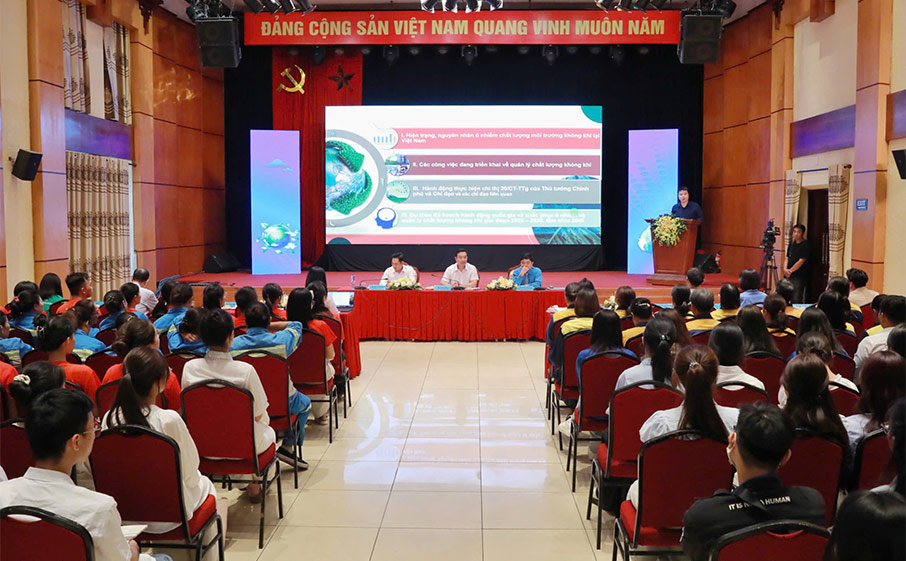
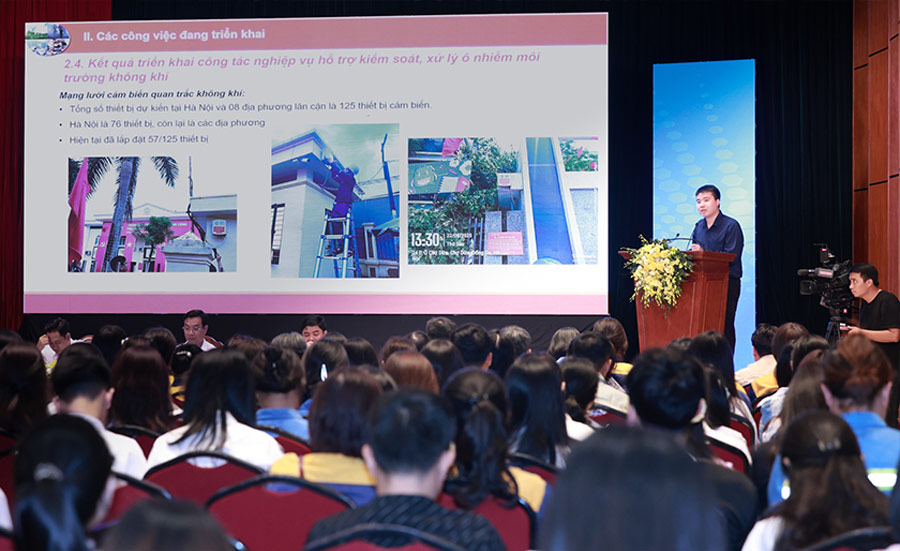
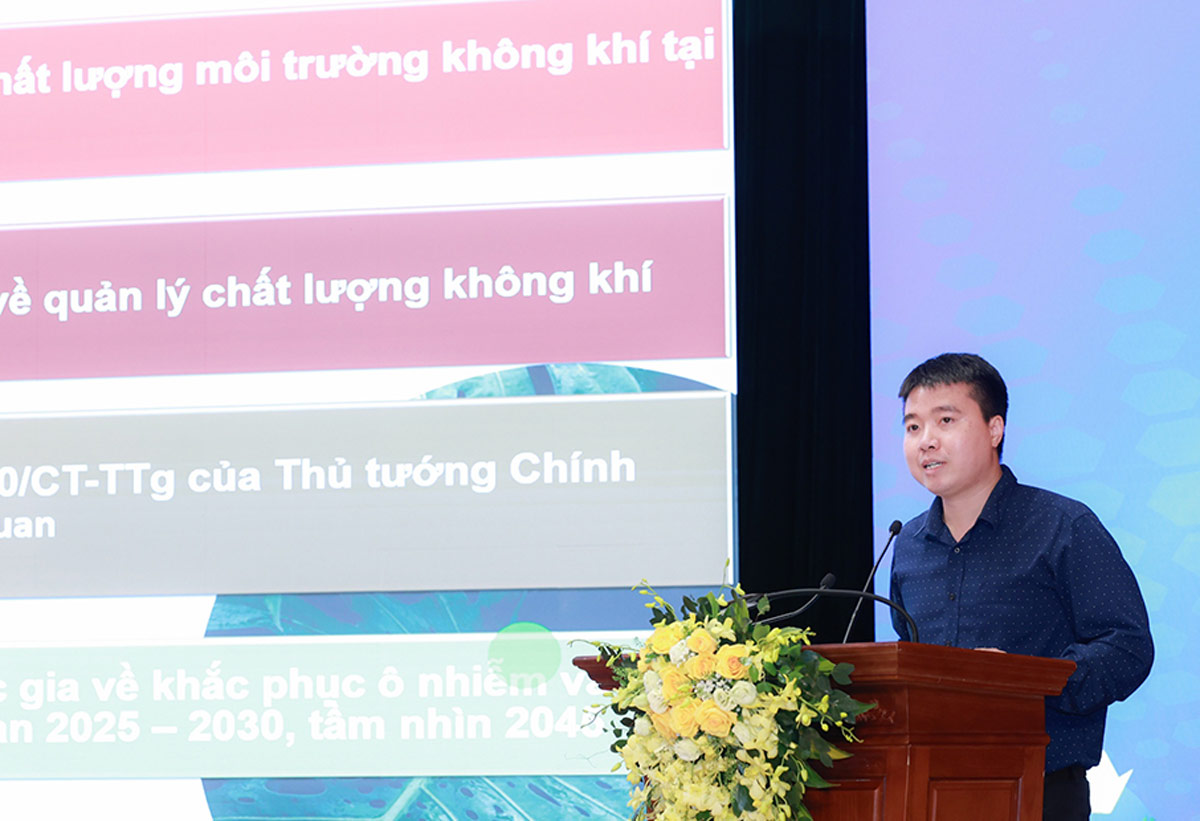
To implement Directive 20/CT-TTg, the Ministry of Agriculture and Environment issued the Ministry's Action Plan in Decision No. 3602/QD-BNNMT dated September 3, 2025. This plan has specified the contents of the Prime Minister's instructions, assigning tasks to units under the Ministry, focusing on key task groups such as: reviewing and evaluating the progress of environmental protection programs and projects; advising on perfecting legal institutions and policies; building a national environmental database; improving the quality of environmental law appraisal, licensing and inspection.
One of the important and key contents of the Department of Environment this year is to develop and draft a document advising the Ministry of Agriculture and Rural Development to submit to the Prime Minister a draft National Action Plan on overcoming pollution and managing air quality for the period 2025 - 2030, with a vision to 2045".
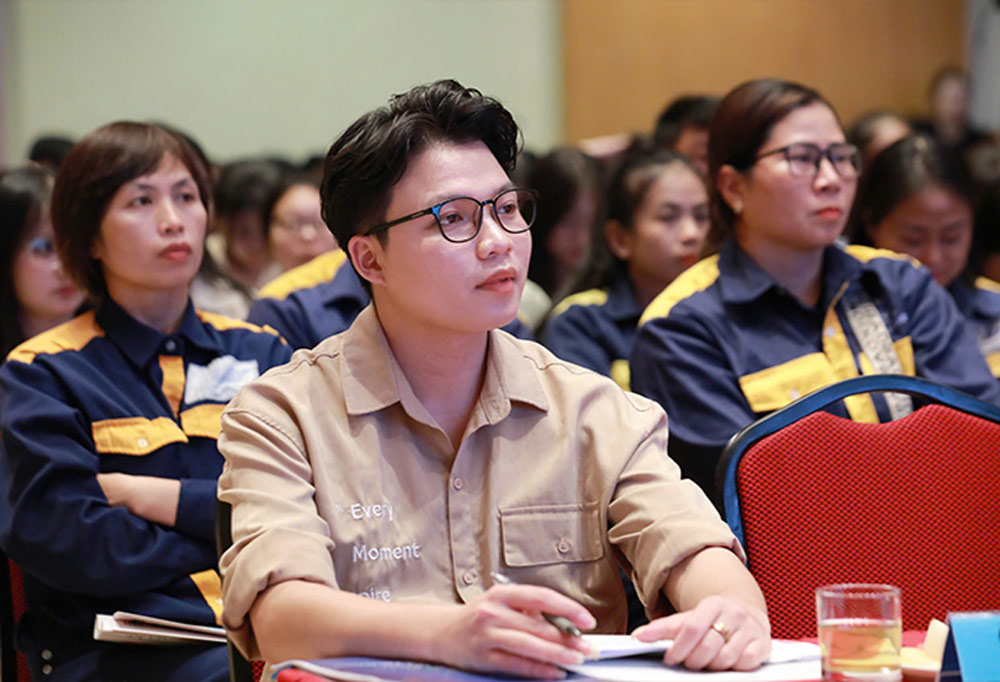
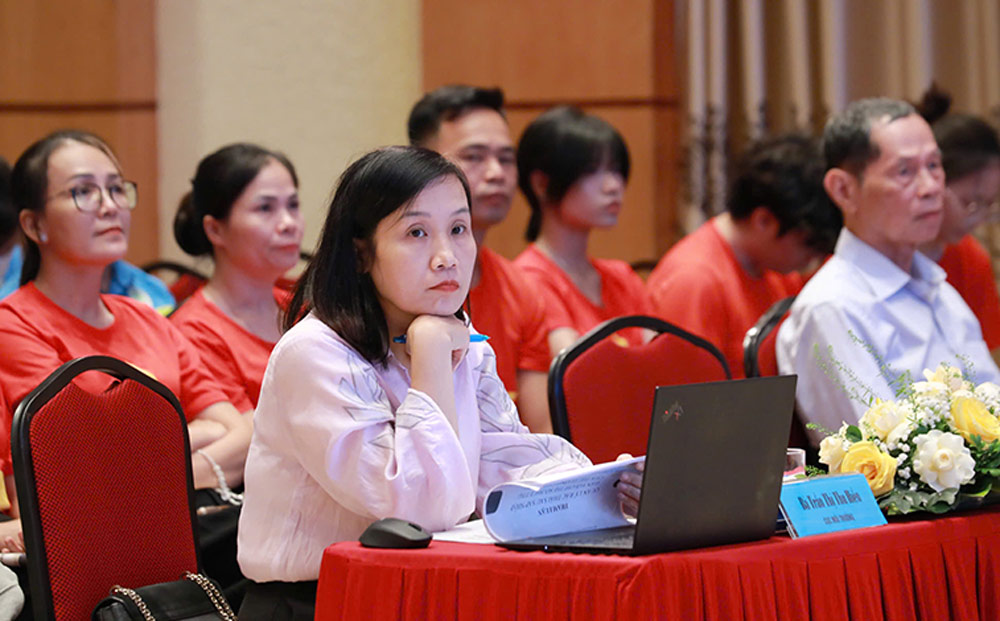
Sharing about key task groups and solutions, Mr. Pham Hong Quan emphasized that the national action plan has identified key task groups and solutions to control and improve air quality.
First of all, it is necessary to improve institutions and policies, continue to review and amend legal regulations, especially the Decree on administrative sanctions in the direction of increasing heaviness to have enough deterrence.At the same time, build a roadmap for clean fuel supply nationwide and establish an inter-regional and inter-provincial coordination mechanism to handle inter-sectoral and cross-border air pollution issues.
For large emission sources, implement policies in sync with Directive 20/CT-TTg to limit motorbikes using fossil fuels in large cities such as Hanoi and Ho Chi Minh City.
Along with that, it will manage emissions from traffic and develop and apply a roadmap to limit personal vehicles entering and leaving the 1, 2, and 3 beltways of Hanoi in the period of 2026 - 2030. All construction works are also required to strictly comply with dust reduction measures.
Some other key activities:
- Control open burning and construction activities: Coordinate with the National Telecommunications Administration to use drones to monitor the situation of straw burning in suburban areas and spreading dust from large construction sites, and immediately transfer the results to local authorities for handling.
- Establish interdisciplinary inspection teams. Coordinate with Hanoi and relevant ministries to establish surprise inspection teams at construction hotspots, traffic and areas at risk of burning waste and agricultural by-products to strictly handle violations.
- Coordinate with media agencies, social networking platforms, iHanoi to communicate and issue warnings when there are pollution hotspots.
- Develop a Draft Regulation on inter-regional and inter-provincial coordination and emergency actions when serious pollution occurs.
Through the above analysis, it can be seen that air pollution is a serious and urgent environmental problem, but we are not passive. Under the strong direction of the Government, the synchronous participation of ministries and branches, in which the Ministry of Agriculture and Environment plays the presiding role, a comprehensive, scientific and feasible action roadmap has been developed and is being strongly implemented.
Taking action for the environment is not only a responsibility but also a command from life, for our own health today and for the future of future generations. The political determination of the Party, State and Government is very high, but to succeed, this war requires the cooperation of the whole society.
More than anyone else, the workforce, especially the brothers and sisters who are working day and night on environmental sanitation, the ones who are operating production lines in factories and enterprises, play an extremely important role. The companionship, support and active participation of comrades, from the smallest actions such as complying with safe production processes, not discharging waste arbitrarily, to spreading awareness of environmental protection in the community, is the decisive factor for the success of the State's policies and guidelines.
14:10: Report "So that every citizen can enjoy a clean green environment in the era of growth".
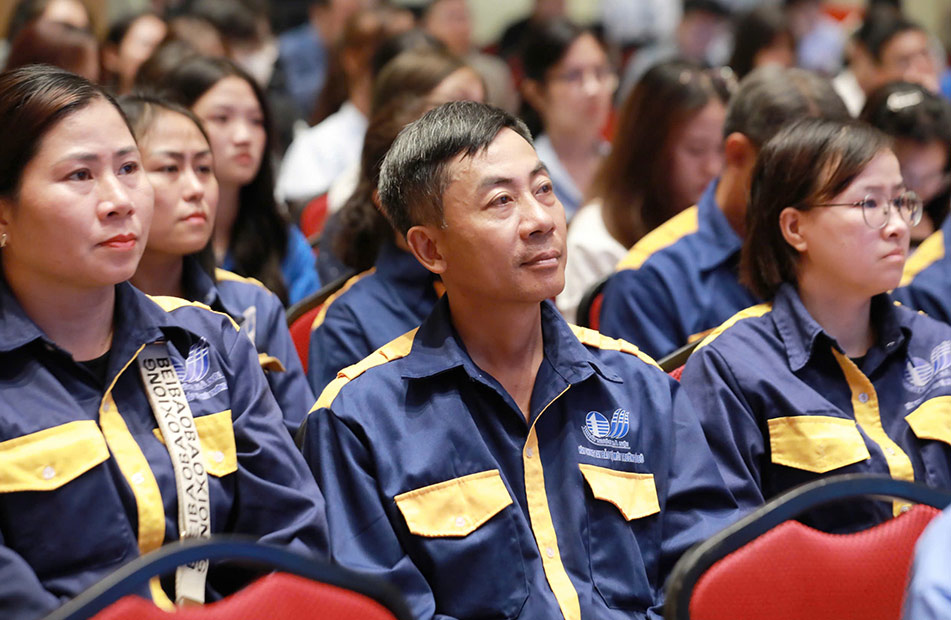
14:05: Speaking at the opening of the forum, Mr. Nguyen Duc Thanh - Deputy Editor-in-Chief of Lao Dong Newspaper - said that on July 12, the Prime Minister issued Directive No. 20 on a number of urgent tasks to prevent and solve environmental pollution. In which, it emphasized that environmental protection work is of special concern to the Party and State, identified together with the socio-economy, environmental protection is an important pillar, inseparable, deciding the sustainable development of the country.
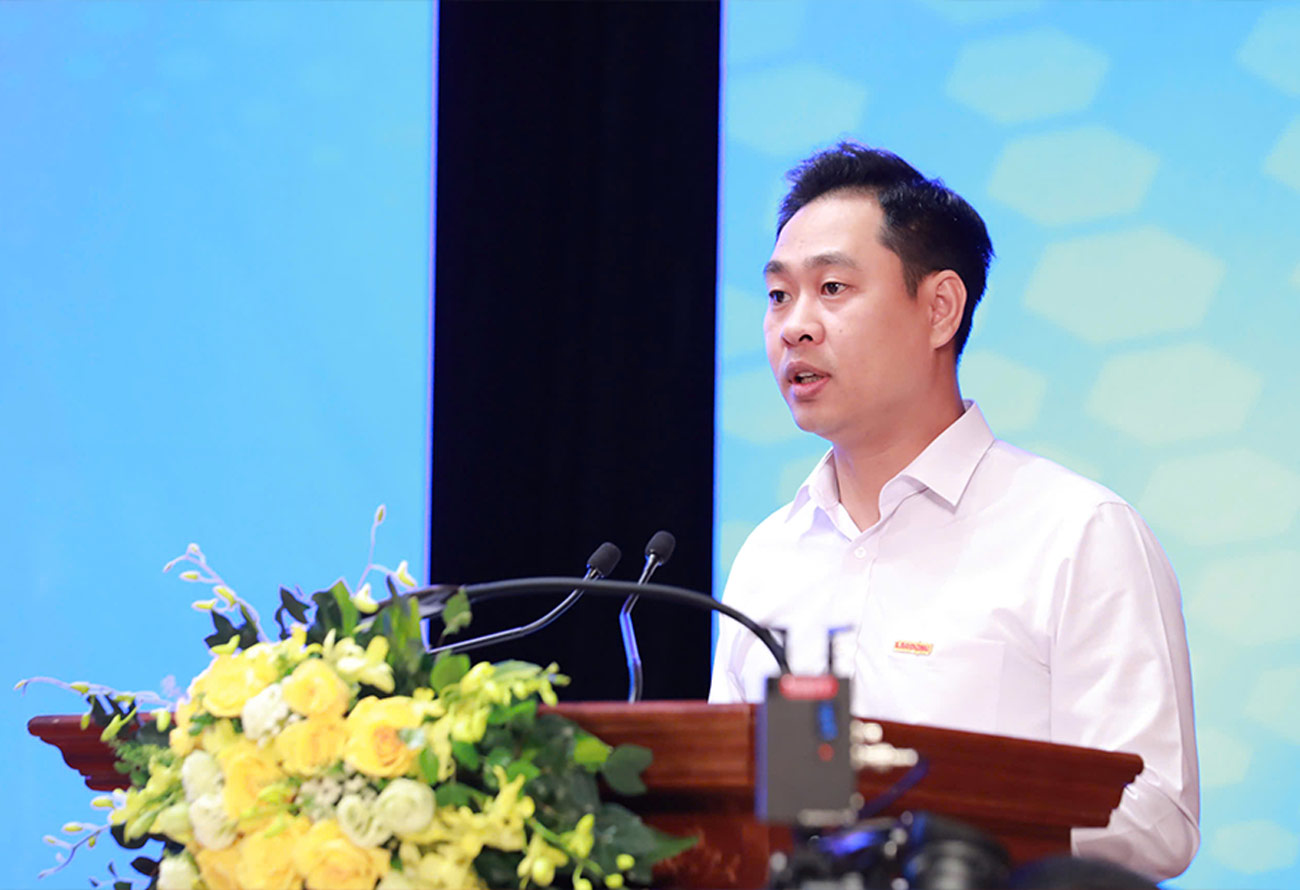
However, current reality shows that environmental issues are still emerging, notably air pollution, water pollution, waste problems, etc. For many years, it has been a problem that has caused public concern.
From this reality, Lao Dong Newspaper under the direction of the Vietnam General Confederation of Labor, in coordination with the Ministry of Agriculture and Environment and the Vietnam General Confederation of Labor, organizes the 2025 Workers' Forum for the Environment with the theme "Management of domestic waste after merger, associated with the implementation of Directive 20 of the Prime Minister".
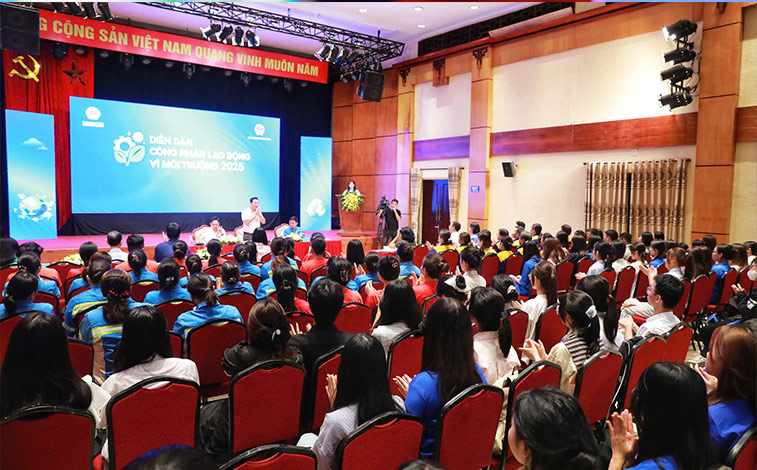
The forum is a voice accompanying each occupational hygiene worker, each locality to continue to promote the protection of the air and water environment, promote waste classification, turn waste into resources, build models for urban and rural waste management and treatment to meet the requirements in the new situation.
We believe that, with just one small action for each person, each agency, each enterprise having a clear commitment, we can completely create a big change in the journey to protect the environment. We hope to receive the response of the entire forum - Mr. Thanh emphasized.
The content of the forum focuses on disseminating new points of Directive 20 on environmental protection, associated with the responsibility of each ministry, branch and locality, in which the capital Hanoi is assigned many urgent tasks.
Highlighting the difficulties and problems in the process of handling domestic solid waste after the merger of administrative units, many contents are overlapping and not synchronous, and at the same time providing solutions for the merger process to go hand in hand with environmental protection.
The forum focused on analyzing the important role of waste classification at source, preparation of localities, raising awareness for each household, raising knowledge for environmental workers in waste classification. At the same time, the Forum listened to the opinions of workers and waste treatment enterprises, answering their questions in the waste collection process.
At the forum, representatives of the Ministry of Agriculture and Environment, the Vietnam General Confederation of Labor and other units will answer questions from workers and laborers in environmental protection activities.



